#inherently superior. so when she tries to manipulate someone who doesn’t see her that way (like her husband or dong-eun) she fails
Text
Relapsed <- thinking about The Glory (Netflix) again
#this show makes me SO INSANE#I could write a literal essay on yeon-jin as a character she’s sooooooooo compelling to me like!!!!!!#the way she truly believes with her whole heart that she’s superior to others bc of how she was born (rich beautiful smart etc)#the way she was taught by her own mother that self-reflection is not only useless but ACTIVELY HARMFUL#the way she’s excellent at manipulation but has a giant blind spot bc she can’t conceptualize other people not seeing her as#inherently superior. so when she tries to manipulate someone who doesn’t see her that way (like her husband or dong-eun) she fails#but she doesn’t REALIZE she’s failed bc it literally doesn’t fit into her worldview#god. I’m vibrating at the speed of sound#this show has so much to say abt choices and impact and morality and the power of good deeds#listen. listen to me.#please watch the glory#sorry for going off the rails in the tags. it will happen again#the glory
10 notes
·
View notes
Text
Miraculous Ladybug Character Observations
Edit - have been asked to tag this as Salt. Don't see how it is but I've updated that.
I was unable to sleep last night and I re-watched the Miraculous ladybug series up until season 4 and I had a few thoughts about the character Arcs we’ve been shown so far.
Marinette - sweet, kind, selfless, brave, naïve, obsessive, kind of a stalker but done with good intentions, passive when not in the mask, insecure, nervous, indecisive when not spur of the moment, catastrophizer. I could go on. (I mean the schedule when I say kinda salkerish. It’s weird as all get and a major red flag but it’s got ALL of her friends schedules on it so maybe it wasn’t meant to be as weird as it was? but combined with the modelling photos. But she’s also an inspiring designer and all the photos are of the Gabriel line or group friend shots so again weird but not as weird as it could be. It leaves us in this position of hating it but also loving it which adds to the discomfort)
Adrien - does not understand the world outside of TV shows, his entire life has been spent being told only what his father wants him to know. This has resulted in immaturity, 'innocence', a lack of empathy on some things because of this lack of understanding, and a child-like understanding of friendship. Due to only having seen romance on TV and his father's attitude of "Pursue until you succeed" he has a tendency to be mildly sexually harassing of the female population (note i do not mean rape please understand degrees of severity. As CN he does not take no for an answer, continues to push his feeling and wants onto LB despite her clear rejections but he never actually does anything explicitly sexual either which leaves us uncomfortable and unable to put reason as to why), he is a passive bully (by not calling out the bad behaviour of his friends he allows it to continue), he is manipulative (threatening to give up his miraculous if Plagg doesn't tell him the secrets). With a little help and experience he could grow up, could be a decent person but that's not going to happen until someone points out his flaws. I’m actually the most mad about Adrien, I loved the soft fluffy boi at first but they’ve done him so dirty and I want to but cant Stan him if they’re going to accept his behaviour and use him to teach people that it's okay.
Alya - Brave, passionate, energetic, and confident. She is a ride or die, type of friend. However, she is also stubborn to a fault, loyal to the point of enabling bad behaviour, her passion for superheroes leads her to danger and she doesn't think about hers or the people she's dragging into the situations safety or wellbeing during those times. Alya doesn't like to be wrong, combined with her stubbornness this at times ends up with her being wilfully ignorant of things (like Lila's lies)
Nino - enthusiastic, friendly, compassionate, a follower, a strong sense of right and wrong, argumentative. Not a bad person it's just that he is more of a follower than a leader so when someone he trusts tells him something he will follow it through (e.g. when Alya all but tells him she believes Lila over Marinette Nino does too)
Chloe - Due to Chloe's dad not being a parent but trying to buy Chloe's love all her life Chloe is a brat, is spoilt, has delusions of grandeur. Due to a mother who left when Chloe was a baby and can not even remember her name, or birthday, or even that Chloe exists half the time it has lead to Chloe having some very severe abandonment issues. And a Flaming Heap of mommy issues where Chloe needs to be perfection personified otherwise she'll never be remembered. This leads to Chloe lashing out at anyone who can do anything better than she herself can.
Lila - proud, loves attention, hates being called out, unashamed to put someone down if it lifts her up, not a smidge of remorse in her body, no empathy. Pathological lying and manipulation, no morality, narcissistic, superiority complex. She is actually the ONLY character we’re given who has ZERO redeeming qualities (They even tried to give Gabriel that weird ‘doing it for true love’ story).
Rose - sweet, cheerful, bubbly, naïve, optimistic, feels deeply about things, open and honest. Her naïve nature means that at times she is taken for granted.
Sabrina - meek, mousy, loyal, book smart, follower. She has a warped sense of how friendship works. Sabrina is willing to do all sorts of cruel things on her friend's orders.
Nathaniel - an introvert, imaginative, artistic, quiet, shy, pan boi, observant, non-confrontational most of the time, jumps to conclusions if he feels he is being teased but will feel bad afterwards for acting negatively.
Max - gamer boi, is mathematically gifted but does not understand human interaction (can calculate exactly how fast Kim has to run but can't see that giving Chloe a gift is a bad idea?). is proud to the point of being selfish in his success (games and maths) but can still back down from his pride if it will mathematically work in his favour. He seems to try to be kind but his lack of understanding makes him stiff.
Mylene - has a crippling anxiety that comes with panic attacks (see horrificator) though she tries to be brave. Is ashamed of her fears, seems to know they are irrational, this leads to her being very sensitive about it. Once she manages to get past the initial fear she is kind, and loving, trying to see the best in people
Juleka - Has Crippling Anxiety, has panic attacks. Can not think of anything worse than having to speak in front of people. This means she is quite often passive. Due to her near-silent nature, she is often forgotten, this leads to Juleka being quite observant but also having what seems to be abandonment issues. These issues could also come from the fact that Jagged Stone is said to be their father and didn't even acknowledge them until season 4.
Ivan - is quick to anger and tends to express his negative emotions through violence, but he's been working on that (in origin's he goes to hit Kim for teasing him but is later friends with him. I call that growth).
Le Chien Kim - VERY competitive, is loud and at times abrasive. He is a jokester who likes to make people laugh but sometimes takes it too far. He will always feel sorry when he does take it too far. Kim can be hot-headed and rude at times but it stems from a place of being firm in his beliefs (even if they are dumb).
Alix - probably the most well-adjusted character on the show if I'm honest. She's impatient, pushy, stubborn, competitive, a little be of a problem with responsibility and authority but not much. Despite all of this we also see her acting patient, selflessly, unmotivated, obeying authority and taking responsibility for things. It makes it hard to hate her or like her. It also makes it hard to assess her in terms of character flaws, possible miraculous, what relationships could grow all of it. (Personally, I think this comes from the fact that she was once meant to be in a trio with Chloe and Sabrina so she's more a prop than a character in the early storylines, I really hope they flesh her out some more in season 4 the way they seem to be doing)
#miraculous fandom#miraculous ladybug#miraculoustalesofladybugandcatnoir#miraculous world#miraculous season 4#marinette dupain cheng#adrien agreste#alya cesaire#nino lahiffe#chloe bourgeois#lila rossi#rose lavillant#sabrina raincomprix#Nathaniel miraculous#miraculous mylene#juleka couffaine#miraculous juleka#ivan miraculous#kim le chien#miraculous alix#a little salty
33 notes
·
View notes
Text
Caged Desire & Emile
I don’t know about you guys, but I’m enjoying the HELL out of this event. Not because I’m a Persona fan (never played a single game), but because it addresses Emile and his biggest character flaw: cripplingly low self-esteem.
Let’s chat.
First off, anyone who follows my more shitposty blog (@incorrectdragalialost) likely knows at this point that I have a soft spot for the sixth scion. I also have a habit of giving him quotes that play up his shitty nature. Emile, the black sheep of the royal family, seems to be a character that is universally despised both in and out of universe. And you know what? I agree! He’s a pretty shitty and terrible person, and I don’t think that Euden should be giving him so many chances. I don’t think he deserves them.
I DO, however, think he deserves a redemption arc, and I think it needs to start with him. Let me explain:
Emile is a very insecure character with cripplingly-low self esteem, and he’s desperate to be seen as equal to his larger-than-life older siblings, who all seem leagues ahead of him. That’s what it comes down to, really: he wants respect, and everywhere he turns he just finds people using him for his royal status or manipulating him towards failure. Hell, Chapter 11 had Chelle tricking him into turning on Laxi and Mascula, and it wasn’t even hard. All she had to do was tell him that they possessed an absurd amount of power. Emile, who feels powerless and useless on his own, jumps at any chance to get more powerful, and it bit him in the ass in the end.
Later, in 14′s interludes, we see Emile trying to garner a reputation the only way he knows how: through showy acts of bluster. Not only does it not work, we see another reason for Emile’s desperate attempts for respect: the common people don’t even know his name.

We can actually see the start of his hero worship in Memories of Youth, where he tries sparring with Leonidas but simply isn’t good enough, and then watches Leonidas and Valyx duke it out as rough equals.
We can ALSO see the start of his superiority complex in His Clever Brother, where Euden clearly idolizes his older brother. Emile basks in finally being relied on for something... and then, of course, Chapters 2 and 4 happen and Emile gets fucked both times. He earns it, sure. But at the end of Chapter 4, Euden says this:

That one line shows that Euden has a lot more insight than he’s let onto at this point. He knows Emile wants to be special. He knows Emile wants his own specialty. ALL of the other Alberian siblings are known for something: Leonidas has his valor, Phares his wisdom, Chelle her espionage, and Valyx his might. (Beren doesn’t count. Nobody knew he existed.) And now Euden gets recognized by these siblings that Emile has been trying so hard to catch up to and he doesn’t. And Zethia? Zethia’s the fucking Auspex! She has holy powers, she prays to the Goddess! Every SINGLE one of Emile’s siblings is better than him in some respect. As a younger sibling myself, I get it. It’s HARD to watch someone else get all this praise while you get nothing.
Now, here’s where Emile has all his siblings wrong: he thinks they all got their specialties effortlessly. That couldn’t be farther from the truth, and as an example, we can look at Euden’s journey thus far. He’s worked VERY hard to get to where he is now--and he has GUTS. It takes brass balls to declare yourself a new kingdom within another kingdom’s territory, not to mention defending and expanding his borders. He didn’t suddenly get that magic touch overnight; he grew his ranks and gathered his warriors, and he trains every day to get better. He has companions by his side to support him, and he supports them in turn.
Emile, though? Emile just... stops when it gets hard. He thinks that he should pick up something perfectly the first time, so if he’s bad at something? He gives up. Sort of in a gifted-child burnout kind of way, but without the gifted part. He doesn’t recognize the amount of hard work that goes into developing skills like that--he thinks they should be as inherent as his own dragonblood. He’s got it all wrong; nobody starts out as a prodigy. You decide you want to master something, and you work at it. And if you’ve grown up with a silver spoon all your life...
So yes. Emile? Terrible person. Treats his allies and enemies like trash. MASSIVE superiority-inferiority complex that feeds into itself and decreases his self-worth while increasing his ego at the same time. He needs a fucking wake-up call--what’s more, he needs someone he respects to tell him that he matters. I hope it happens sooner rather than later, because I’d love to see how his reformation arc goes. He shouldn’t be instantly forgiven, and he should fucking WORK for his respect. Even if Euden’s memories of the past are clouded by nostalgia, the guy has a knack for seeing the light in anybody’s heart, and I hope that he’s right on this count.
36 notes
·
View notes
Text
The Way You Speak | Dante x Anatole
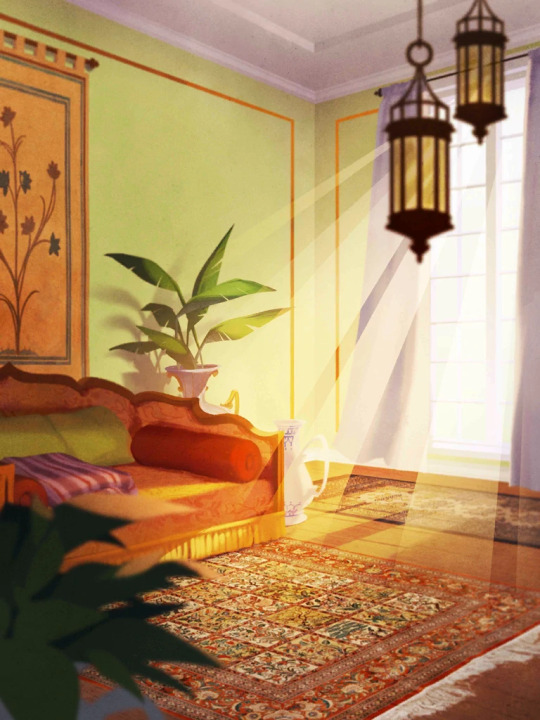
✴︎ THE WAY YOU SPEAK ✴︎
1.2k words. Dante spends the night with Anatole, and his curiosity gets the best of him. This fic explores Anatole’s magic, but I don’t make an overly detailed exposition of what it entails, if you want to read more about his magic, you can read it here, and here.
Dante belongs to @arcanecadenza
Washed, clean and cosy, Anatole and him cuddled naked on the latter’s bed, mismatched parentheses as Dante used Anatole’s chest as a pillow, his heart beating steadily under his Amor Vincit Omnia tattoo. Anatole’s fingers played over his spine like his bones were the keys of an invisible piano.
Dante would’ve tried to figure out the tune, or if it was a song Anatole was making up or a song they both knew, if there wasn’t such a present, growing question in his mind. Sex aside, he hadn’t forgotten about Anatole mentioning his magic.
“Nana?”
“Yes, Dante?” His voice was muffled against Dante’s hair, where he had his nose buried.
“How does your magic work?”
Anatole tensed in Dante’s arms.
“Why would you like to know?”
“You mentioned it earlier. You almost never do, but we don’t have to talk about it if you don’t want to.”
Anatole felt his thoughts start to race in his mind, but eventually forced himself to relax, sitting up against the pillows of his bed, forcing Dante to move too.
“I don’t mind telling you?” The hesitation in his voice was palpable. “You wouldn’t be here if I didn’t trust you… alright I will tell you, but you have to promise me one thing, Dante.”
He wasn’t expecting such solemnity, but he promised anyway. “I’ll do my best.”
“Promise me that if I tell you you won’t: tell other people, I would not like it to fall into the ears of people who do not understand it, and therefore affect the credibility I need to have in my job and in front of the City — Nadia knows, by the way, so don’t worry about that.”
Dante was thrown off for a moment, not meaning to interrupt Anatole when he thought out loud. “You’re on a first name basis with the Countess?”
“Given how I’m bound to become her right hand, I am. She’s also surprisingly calm about these things, once she trusts you. Anyway, Dante, there’s something else. You have to promise me that, if you trust me, and I tell you that there’s certain things I can do that I don’t and would never do to you, you will honour that trust and you will believe me.”
The weight of the promise was heavy. The way Anatole spoke about it was enough to set up a cautious alarm, but the earnest, candid honesty in Anatole’s words and the plea in his eyes made him nod in agreement. Anatole was a private man, and Anatole was a proud man, despite his non-boisterous nature, and his honest belief in not having any sort of inherent superiority. The pride, Dante had learnt, came from knowing who he was — what he was worth, and what he could do.
Anatole didn’t share who he was, Anatole didn’t invite you into his life, unless he thought you could appreciate it. He had the passion of youth, and the determination of someone who didn’t do anything by halves; lively and clever, and disarmingly debonair, seeing more of him had also come with the realisation that Anatole carried things, secrets, sorrows and responsibilities other would never know about, unless Anatole let them know.
Anatole leaving him guessing was only reserved for their flirting, and even then Dante had learnt he always showed or said what he meant. He had learnt to recognise many of his silent moments as offerings. He would be lying if his curiosity didn’t urge him to accept this one too.
Dante leaned forward to kiss Anatole’s cheek. “Whenever you’re ready.”
So Anatole told him. He told him about how it began manifesting, he spoke about light and languages and the things he could do with both. He spoke about how learning languages faster and better than most was only the surface level, and sometimes, even more shallow than surface: a mist that hit your face as you walked on the shore. He spoke of creation and light refraction, glyphs and incantations and being able to not support his magic on written symbols at all. He spoke about what he was currently studying, about his studying abroad, and how accidental things had taken him to realise some of the most important things about his magic.
He checked on Dante’s reaction as he explained periodically, but he only found genuine interest in him, which propelled him to talk, and talk and talk about it, finding himself feeling safe and comfortable to do so. The relief he felt as he was able to laugh and gesticulate and demonstrate things for Dante was akin to the mirth of a child during his dream birthday party.
In that moment, Dante couldn’t think about any other reaction anyone would have to Anatole speaking and practicing his magic, this source of inexplicable power he had so lovingly and dedicatedly worked on, as anything other than charming.
It hit him later. He woke up in the middle of the night to use the bathroom, Anatole’s words churning in his half-awake, half-asleep brain. Entirely out of accident — like all great discoveries in life, he thought — it came to him as he watched him dead asleep in his own bed. If Anatole wanted, he could create things out of thin air. If Anatole wanted, he could put any intention in his words, to the point of no longer believing what was real or not in his own speech, to his own convenience. Had Anatole been more selfish, more manipulative, more domineering in his general way of being, having a forceful personality instead of a strong one, he could cause severe damage with his words.
He thought about different religions and mythologies around the world, of entities which create things which take different shapes and forms, as his eyes trace Anatole’s back, and suddenly understand why his credibility depends on people who also work in diplomacy and politics not to know this, unless they absolutely need to know.
He didn’t doubt he used the most advantageous, strategic parts of his magic in his job all the time, even if he didn’t use them maliciously — Anatole was not a bad man, but he wasn’t a fool — but as he throws an arm over his waist and buries his face in the base of Anatole’s neck, he thought about that Anatole which doesn’t exist, creating illusions and misunderstandings on purpose, for his own gain, and of the Anatole he knows now, the one who does exist.
He who instead must feel all the burnout of miscommunication, he who knows when people are lying to him and how he still decides to put his faith in people. Dante realised Anatole feels every break and failure in communication, without being able to tell the reason why, and wondered how it didn’t drive him crazy. How it still made him believe in people.
Maybe this is why Anatole always insisted he believed in everything he said, otherwise, there was little point in saying it. It didn’t that he literally believed in everything that came out of his mouth, or only said solemn things, but that he always meant the intention behind his words. Dante didn’t fully understand it, but he appreciated it all the same.
As he drifts off to sleep he thought existing in such a way must be lonely sometimes. He thought about all the nights he himself spent alone in the middle of nowhere, having left so much behind, an uncertain future ahead, and wondered if him and Anatole weren’t so different after all.
21 notes
·
View notes
Note
Hey Lightning, I was wondering if I could get your thoughts on something. One take that seems to keep returning every once in a while is the "Allura fell for Lotor only after he revealed his Altean heritage," but I know u and others have disproven this many times, which does reassure me. While I love Allura, I definitely think one of her weaknesses was her devotion to Altea and singing Alfor's praises, which sometimes became too much. At the same time, it bothers me when I see some ppl (1/?)
Continuing anon message: “ say that she thought Alteans were superior to all other races, and that when the colony plot twist happened, she became repulsed by Lotor's Galra side, which is why she rejected him. For them, that's why she forced violent memories onto an uncorrupted Zarkon, but somehow "saw the good/redeemed" Honerva, the Altean. I can kind of understand where they're coming from, but for me, it just didn't make sense that Allura suddenly had a change of heart considering for most of s8, she was angry and dead set on going after Honerva. Even with that, I think to a lot of her fans, s8 made Allura so ooc that she became unrecognizable, which hurt to watch. I guess for me it's hard seeing antis and people who don't like her claim that that's just how she is and has always been. Haha sorry for rambling, but I'd love to hear your thoughts on this, since your arguments ease my mind on a lot of things when it comes to Allura :)”
Hi, anon. Wow, thanks for your extended note! I don’t know anywhere in canon that Allura champions Alteans as a superior race. The definition of racial supremacy is a belief that inherent genetic differences between races determine cultural or individual achievement, with social/governmental policies championing intolerance of other races. To get Allura to fit into such a label:
1. A viewer has to ignore or undermine all the evidence available about who the main-universe Alteans really were before main-universe Zarkon’s massacre of them.
2. A viewer has to ignore or undermine how Allura actually responds to a variety of different races in the show, including her own.
So let’s start with issue one. To support an “Allura was a racial supremacist” opinion, a lot of antis (and even non-militant, average viewers) are favorable to the opinion that Alteans as a group, including Alfor, were actually evil and violent colonizer elitists before Galrans killed them off. In other words, they question Altean victimhood, and this allows the militant antis to poison and undermine scenes of a woman mourning her home and her beloved family. And it just gets to be a really unsettling conversation, to listen to someone actually try to justify genocide. They’ll also have suspicions that all of our foundational backstory in the s3 finale was just “cleansed” propaganda from Coran. So if antis can undermine Allura’s entire race and family as corrupt, then they can intentionally undermine any of her canonical statements about or efforts toward peace. Which is hilarious, because this racist tactic applied to Allura is actually what a lot of antis accuse Allura of doing with Lotor.
For the record, I don’t think the show production team actually intended the subliminal messaging/cognitive dissonance that I’m about to discuss. The people who designed and developed this show are fans of robot kitties and aren’t PhDs in social issues. But I think there is a very serious issue about the portrayal of genocide victims that feeds into some very real problems in our world, especially regarding the concept of racial supremacy and conspiracy theories about genocide victims.
VLD tried to play with both genocide politics for edge™ points while ALSO playing with shatterglass theory (shatterglass meaning an AU where the heroes are villains and villains are heroes). Combining these two concepts into the same universe creates some incredibly disturbing subliminal messaging about Alteans that very closely mimics ongoing neo-Nazi propaganda against Jews. Nazis and other anti-Semitists justify their hatred of Jews by equating them as terrible villains out for world domination via some underhanded shadow control of the mass populace. It’s an incredibly malicious form of propaganda, because it works so terribly well. And what do you know, VLD plays right into this kind of propaganda. In the season 3 episode, Hole in the Sky, we’re faced with team Voltron confronting an Altean Empire that was actually evil and out for multiverse domination. And oh by the way, they’re using malicious shadow tech to control a mass populace.
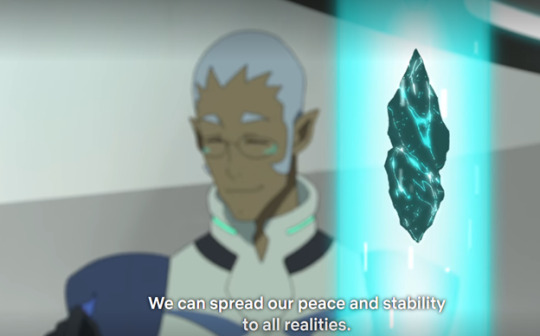
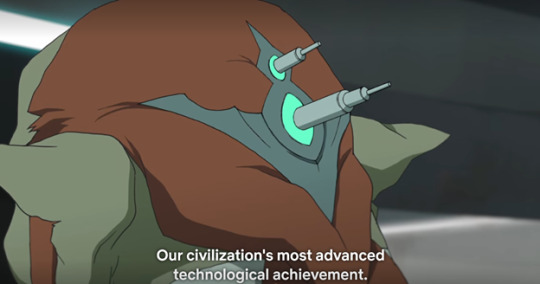

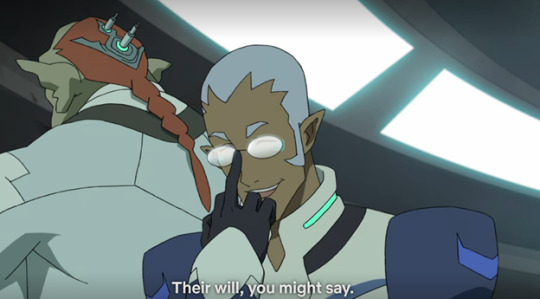
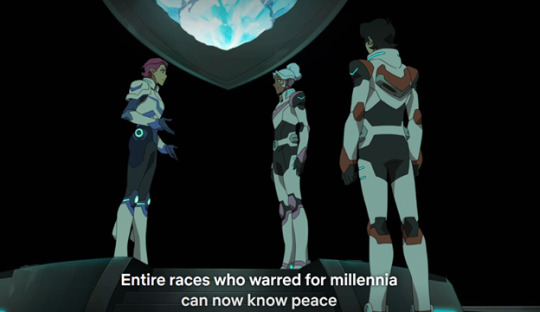


It’s like someone on the production team read the Protocols of the Elders of Zion and then just copied/pasted that incredibly damaging and widely accepted conspiracy theory right onto Alteans for s3 funsies because edge content.
This is incredibly punishing, for the narrative to wave the carrot stick in front of genocide survivors that maybe some others survived—and then to suggest that Alteans were the evil ones all along. A shatterglass twist worked very well in Captain Marvel (2019) for a lot of reasons, for example, but it just doesn’t work well in the VLD universe given that the show explicitly portrays the genocide victims as evil and validates this concept. And this episode unfortunately feeds ongoing cognitive dissonance in antis that if AU Alteans could be so evil…how certain are you that they aren’t in the main universe too? On the reverse side, the main-universe goes out of its way to portray that not all Galrans are evil, and even that Galrans were the primary resistance (BOM). But in this singular episode, we see a united Altean empire. And the only Altean who moves to stand against it once the shine wears off…is Allura. There is no AU Altean actually shown in the Guns of Gamara. So Allura stands alone as an Altean against her own people.
For this reason, this episode doesn’t function very well as a shatterglass AU either, because the moral “flip” isn’t a mirror balance to main universe. The Alteans of the AU world appear as fully united in their evil plans. And then, no doubt, anti-alluras point out other quirky things about main-universe Alteans throughout the show—the violent language-learning system that scares Pidge, and the ancient Altean terraforming technology that Haggar activates, and the fact that Oriande is a hidden place that keeps out the less magical with a violent guardian. These details, when removed from main-universe world building, create a cognitive dissonance about whether main-universe Allura and Alteans were actually genuine in how they depicted respectful “peace and diplomacy.” So anti alluras who believe Allura was a racial supremacist really rely on this s3 episode and these details to uphold their conspiracy theory.
So let’s focus on Allura in this episode, because it says a lot about who she ultimately is as a person, and people have forgotten how she actually responded in this episode. Allura is unquestionably hopeful at the thought that her and Coran might not be the last Alteans alive. Pretty understandable. If I were the last human, I’d be darn excited to find out there’s more of me left, lol. So her experience as a genocide victim initially blinds her to the evilness of these Alteans. You can even see the ache on her face, of how badly she wants to believe their narrative of peace.

So Allura is initially star-struck that she and Coran are not the last Alteans, yes, and that somehow they’ve achieved a “peace.” She is also not afraid to admit that they would be valuable allies in the war:

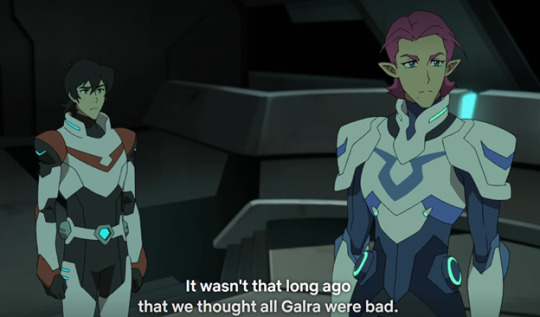
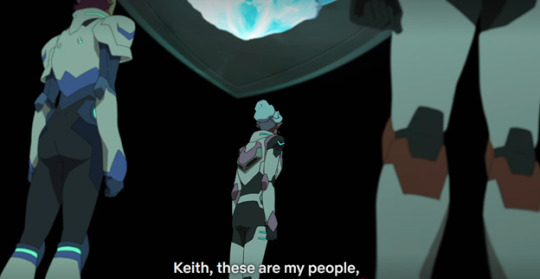
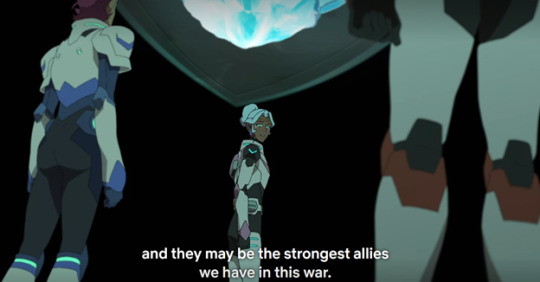
And she’s not wrong there, considering that they have what appears to be extensive military resources and a robot force of their own. But she makes a critical mistake in assuming that “these are my people” means that they share main-universe cultural sentiments. The instant Allura hears Slav (so not someone of her own race) call these Alteans out as actually evil colonizers turning people into slaves, she begins to question the narrative she’s received.
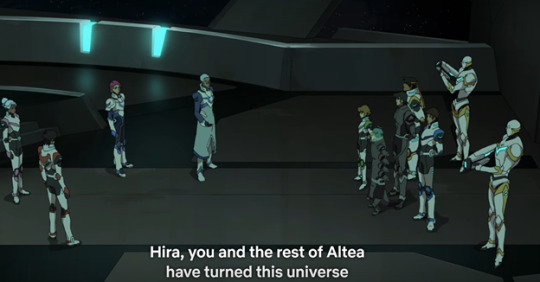
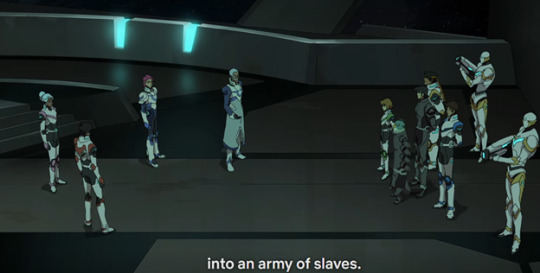


In this instance, she actually affords the Alteans the same courtesy she afforded Lotor—the opportunity to deny the accusations.

But in the AU Altean’s case, they try to turn blame back on other parties. Allura listens to Keith when he grows increasingly fearful of what the Alteans might do to the others, and she tries to plead for actual peace:
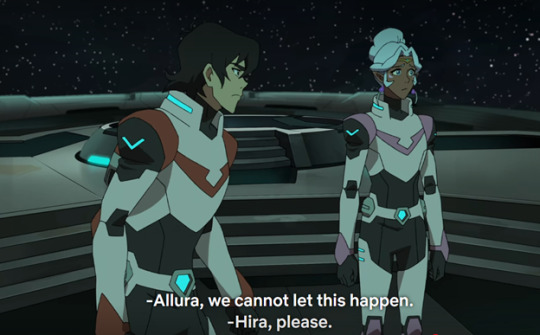



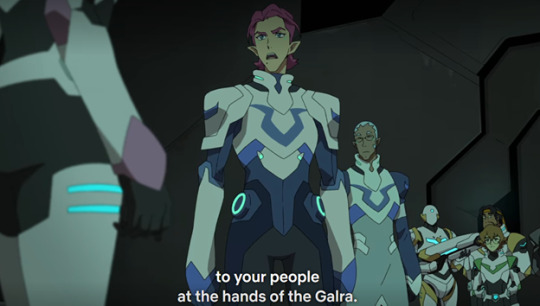
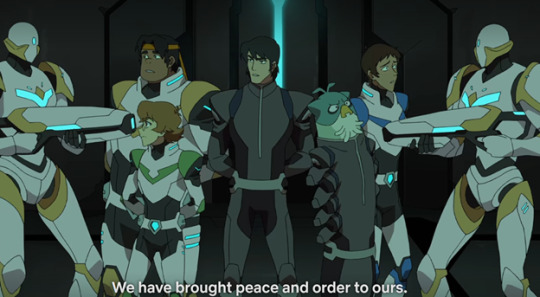
And actually, this is a pretty interesting moment for Allura. She tries to salvage an alliance…until she realizes that their differences are irreconcilable, and that their definition of peace is inherently different from her own. This probably sets the stage for why Allura was so triggered by Lotor talking about peace while also killing people—because she’s seen people misappropriate that term before. And also probably informs why she trusts the information of both Keith and Krolia (both of whom have Galran blood, btw).
Ultimately, Allura turns against her own people. Violently:

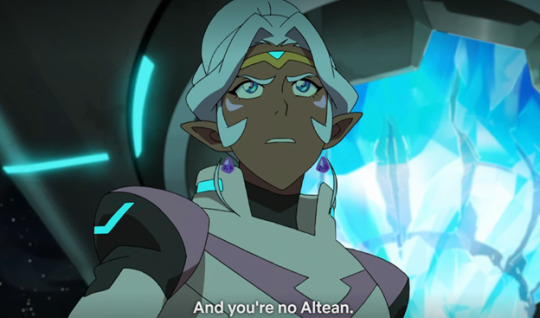

When they get angry about her wanting actual peace, Allura draws a weapon against them and rejects them from her people. This mimics how she spends several seasons fighting an Altean Haggar/Honerva for her crimes, and how she turns against Lotor too.
So case in point here, Allura loves her people, obviously—but she also is holding them to moral standards regarding their behavior, which is something that a genuine racist doesn’t do. As a matter of fact, Lotor is the only person of Altean blood that Allura genuinely bonds with ever again in the series. She’s distant with Romelle, she’s distant with the s8 Alteans… In s8, Allura even says this about Luca, which refers back to her own mistakes she made with initially being star-struck by the s3 AU Alteans who came in “peace”:
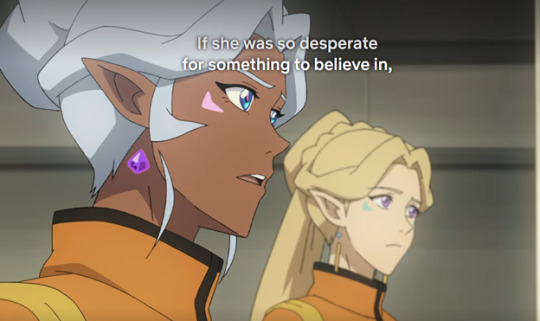
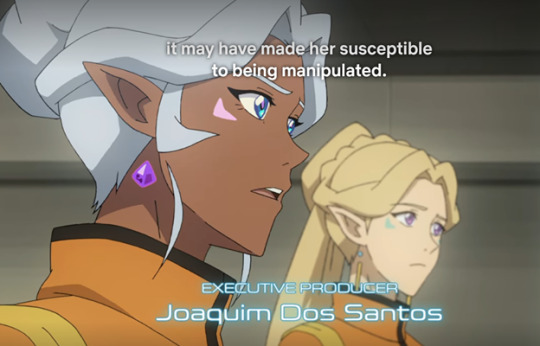
Allura herself had been manipulated in s3, wanting so desperately to not be the last Altean alive that it initially blinded her to how Commander Hira was manipulating her. The plight of the s8 Alteans who are deceived by Honerva is inherently frustrating to her, because she can see herself in them.
Absolutely none of this correlates with Allura seeing or perpetuating Alteans as a superior race. At every turn, her own people continue to disappoint her, and she increasingly and progressively separates herself from them in hopelessness, because they’re so brainwashed that they can’t see they’re just cannon fodder for someone else’s military agendas. Not exactly a ringing endorsement for a superior race, lol.
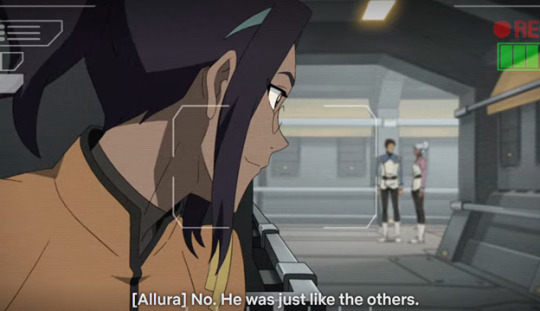

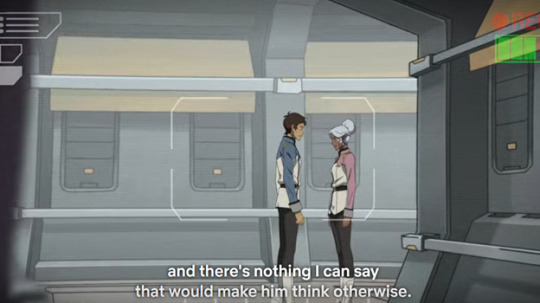
So let’s think about anti accusations here. Allura is a racial supremacist…but she’s arguing against her people who believe unquestionably in Honerva, another full Altean like herself? Nothing about that accusation makes sense with her actions.
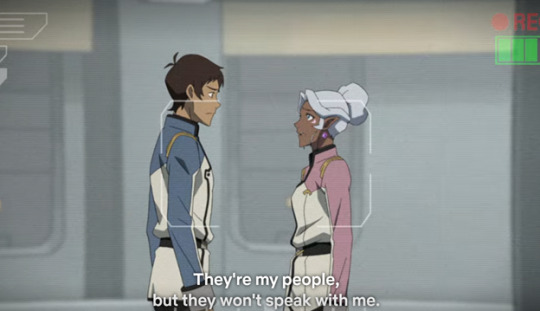
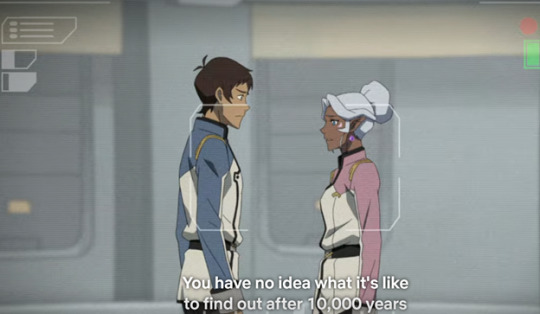


The fact is, consistently from season 3 and onward, Allura is faced with her own people morally disappointing her.
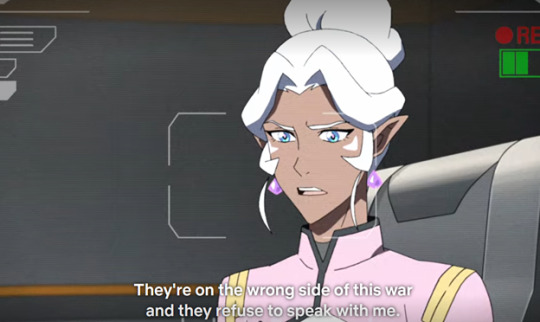
The good news for the s8 Alteans like Tavo is that Allura is able to remove the dark entity Honerva is using to control him. Which allows other Alteans to “wake up” from being manipulated and try to make amends.
Regardless, Allura makes a very clear line that simply being Altean doesn’t make someone “right.” She sees herself fully at odds with her own people who are drawn in by Honerva’s lies. And she experienced well back in s2 (revealing Haggar as Honerva) and s3 (evil AU Alteans) that any given race, including her own, can house people who do bad things.
The fact is, she’s consistently and willingly drawn weapons against even her own people when they didn’t meet her moral expectations. So her response to Lotor isn’t particularly out of line there. She’s repulsed by a moral flaw.
And actually, Lotor himself wouldn’t have known this, but he very oddly echoed the AU Alteans by getting angry that Allura was angry over the means through which he was trying to get peace:
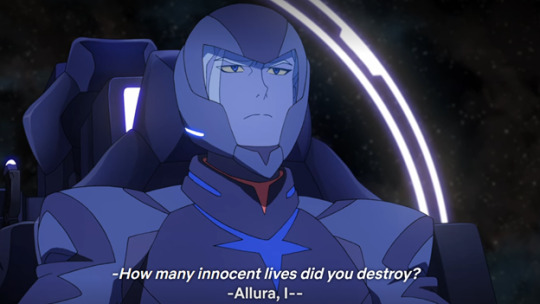


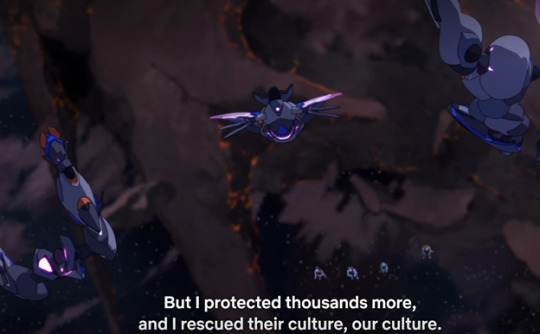

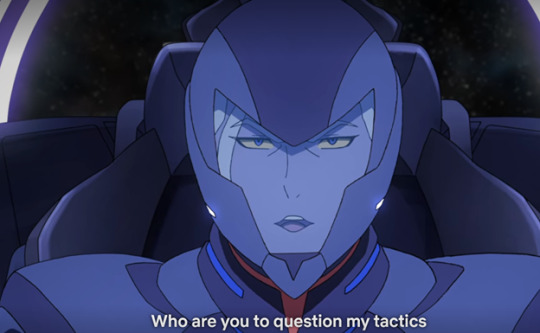
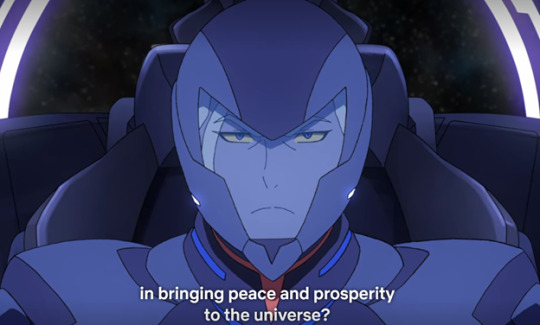
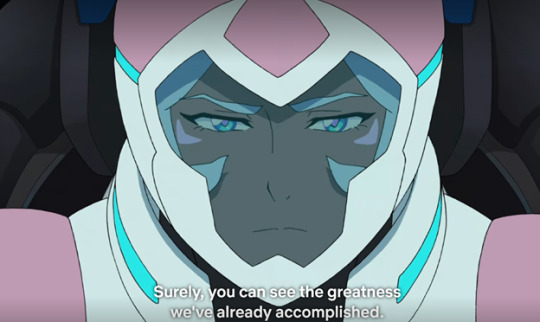
So Lotor actually reverts to the same logic of the AU Alteans—peace at any cost, just look at the results—
And keep in mind that the AU Alteans also manipulated Allura’s excitement about them, to get her to make the transreality comet usable so they could go into other realities. So Allura has felt betrayed and used before, by her own people.
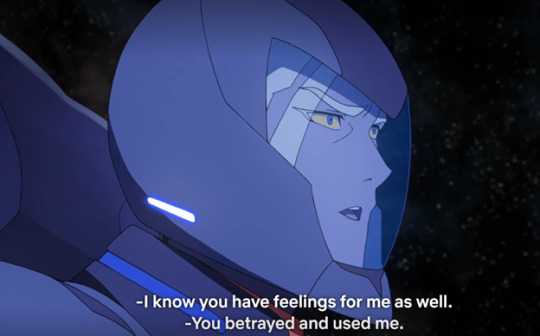
So when she says this:
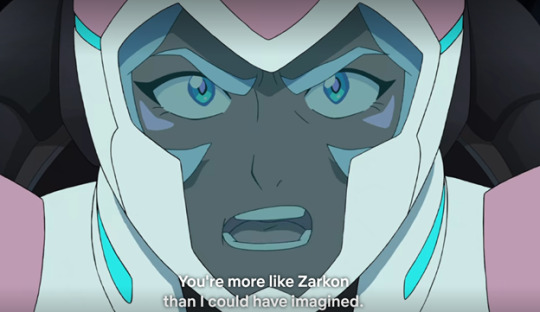
Yes, it’s a reference back to how Zarkon manipulated his friends in order to get access to the quintessence field, at the explicit cost of potentially killing his own people. But it’s not without understanding that yes, Alteans can be just as manipulative and betraying as Zarkon. Because she’s experienced it, again and again.
As a matter of fact, six out of the eight seasons of Voltron: Legendary Defender feature villainous Alteans/Alteans on the wrong side of the war, and we continuously see Allura punished again and again for wishing that Alteans still lived.
No wonder she wanted to die.
This is something that I find uncomfortable about the narrative of the show. Previous iterations of Voltron did in fact have a “blood on everyone’s hands” perspective, such as within the ages 16+ Dynamic Comics. However, Arusians/Alteans in those old Voltron narratives were not victims of genocide. VLD turns Alteans into victims of the worst racial crime possible and then also consistently portrays them as inherently antagonistic to genuine peace efforts in some way, instead of focusing on the evil of the oppressors.
And this is such a double whammy for Lotor’s characters as well, given that he was abused by his parents and threatened with slavery via his Galran culture, and that he was half-Altean too trying to connect to his lost culture.
As a matter of fact, the larger show’s narrative interest in “victims as antagonists” makes it such that when we see victims try to enact actual justice, it feels almost jarring. Let’s look at that s8 Zarkon moment you brought up as an example, where Allura destroys his innocent perspective by showing him his evil deeds.
The s8 Zarkon is a weird topic because 1) This Zarkon actually doesn’t exist outside of Honerva’s mind, so how he has any kind of actual free-will is beyond me, unless someone wants to argue that Honerva actually cursed his true soul just as she cursed the other paladins. It’s hilarious too, because Honerva-mind-Zarkon also calls Honerva a psychopath, so I guess now Honerva is psychoanalyzing herself using her dead husband as the vehicle, while also discreetly helping the paladins to stop herself—
ANYWAY, using this Zarkon as a “proof” of Allura’s “racism” is also cherry picking in the weirdest of ways. Is she angry about his horrific and incalculable crimes, including even how he betrayed the OG paladins and ruined his own planet? Absolutely. Does she want him to be aware of his crimes instead of having to pretend like nothing’s wrong? Yes.

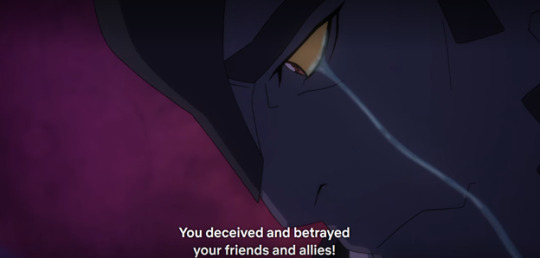
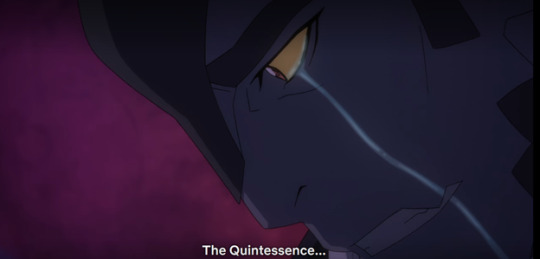
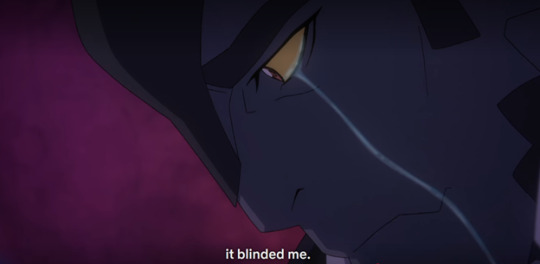
But notice here, this Zarkon actually shows remorse. He is actually crying over those memories and recognizing that he had done something wrong. And Allura can work with that. In fact, out of everyone standing around and doing nothing, it’s Allura who gives him a second chance and offers an alliance with Zarkon in order to stop a crazy Altean:
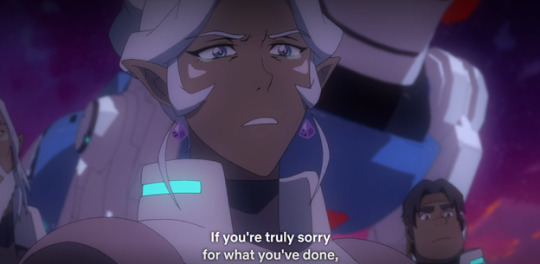
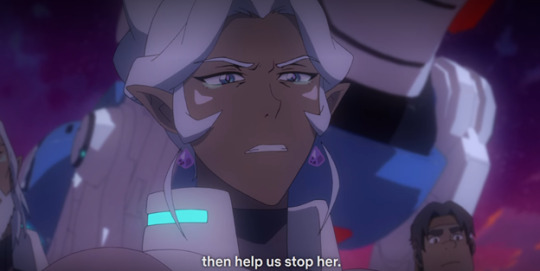
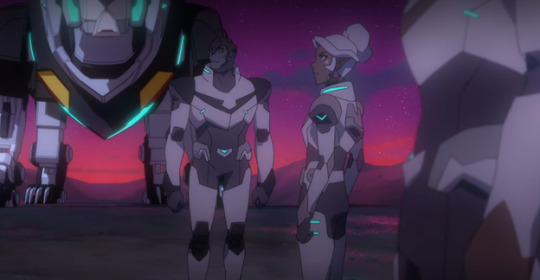
Keep in mind too, Honerva didn’t have memory loss at the end of s8. She knew exactly what she’d done and had given up and had to actually be convinced to do anything halfway constructive. That’s a very different circumstance than mind-Zarkon had, who jumped at the chance to do something to fix what all had happened, and gets even morally righteous about it, calling his own wife a psychopath, lol.
So generally, antis who believe Allura was a racial supremacist haven’t watched the show holistically. We see her hold the same standards to her own people as she expects out of others. This show would look incredibly different if Allura were a true racial supremacist.
Ah, you ask. Okay, so we’ve refuted the big pieces of “evidence” used to incriminate Allura. But what about all of those weird details about ancient Altean history? The violent language-learning program that scared Pidge? The violent terraforming tech that almost kills Voltron? The concept that Alfor tried to play “police” over the Galra and actually blew up their planet? The Alteans’ ongoing discussions of “peace and diplomacy” and spreading it throughout the universe while they happen to sit on a massive load of ancient power?
The s3 finale and other facts throughout the series very heavily smash the claim that our canon, in-universe Alteans were evil colonizers like the AU Alteans. The biggest piece of evidence to the contrary is that the Altea we know was one (1) planet. You counted right. One planet. Not an empire, but a singular planet. The s3 finale corroborates this, showing Altea as being largely isolationist from a military perspective while Daibazaal and Nalquod warred "for generations," right in front of their salad.

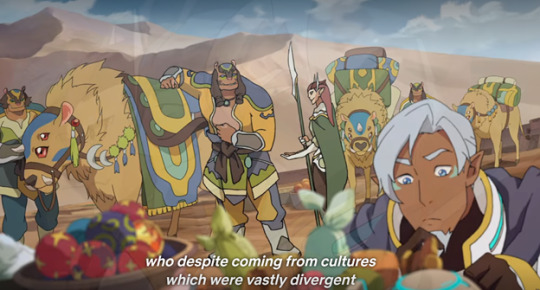


So some viewers would have you believe that Alteans were these big bad, intergalactic police state colonizers. But for all of its great power and knowledge, the singular planet of Altea didn't even canonically interfere in the wars of its own galaxy for actual millennia? And looking at the screenshots upon the stabilization of the alliance, Alfor is revealed to not have had experience with a neighboring culture. His face while exploring Gyrgan’s homeworld is an indication that it’s all rather new for him too. So again, we have evidence showing that Alteans were not colonizing or even functioning as a police state.
Note here that in the s3 flashbacks, the show confirms that it actually wasn’t just Alfor who suggested an alliance. All five leaders had common interests in protecting their galaxy from even worse threats, so all five came together at the same time. This is actually the first piece of evidence we have of Altea entering into some kind of intergalactic military agreement to stave off said worse threats.
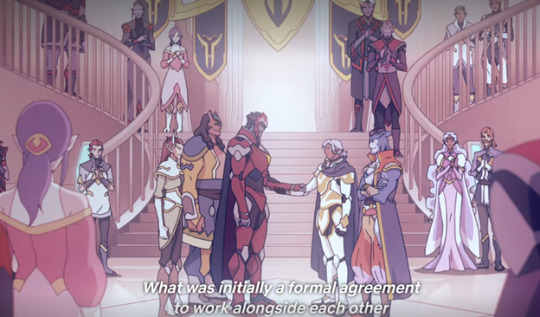

And all of this is on top of a history where in s6, the Galran Archivist confirms that the Galran Empire had existed before Zarkon for 3,000 years, with times of “expansion.” It’s very easy to see that Blaytz’s people were actively fighting off Galran occupation of their homeworld within this past.
And that’s actually what I think makes Alfor and the OG paladins some pretty interesting characters. Here, we had colonizing Galran empire setting down its sword and accepting the value and space of its neighbors. Here, we had master alchemist Alfor giving up military power within their group by acknowledging Zarkon as the superior strategist. Here, we had Blaytz who had previously been battling Galran occupation…fully accepting the Galra?

So the OG Paladin backstory represents a pretty incredible alliance that removed a lot of intergalactic toxicity and helped heal broken bonds. But it required all five leaders to agree to that. Alfor did not throw his weight or power around within this. There were several checks and balances here.
But this backstory also helps to explain some of the quirky details about Alteans. Their planet existed within an active war zone, and it’s very likely that they’d had to fight off Galran occupation just as Blaytz’s people did. So the violent robot trainers and fear-based language learning systems start to make sense. Alteans weren’t just simpering people playing harps all day and eating grapes. They were actively prepared to defend their planet and their culture.
So when Allura says in season 1 that Alteans were “spreading diplomacy” across the universe, the only pieces of evidence we have of that is the OG paladins themselves, in which Alfor was a big part in creating that alliance—and then possibly the Alteans with the Balmerans, given their deep collective rituals with that planet while the Galra literally just came in and ripped the planet nearly to death. Allura tries to mimic what it means to accept and interact with a culture without changing it well in season 1, when she stumbles through trying to respect Arusian culture and its demands on its people. Also, there is a big fact that antis like to overlook:
The fact is, despite the untold numbers of civilizations we interact with across 76 episodes, no outside race remembers Alteans as evil colonizers. If they were really so big and bad, we would have heard it, like, “Man, yeah the Galrans are bad. Just as bad as those Alteans, back in the day.” Or something. But nope, nothing.
So I heavily question the history of Altea as an ancient colonizing race. If they were, then Altea wouldn't have just been a single planet with limited resources to fight wars in even its own galaxy. All of this supports the idea of Altean children being raised to fight--because they were preparing to defend themselves when/if diplomacy fails.... But the fact that the Balmerans see Alteans fondly and that literally every other race we run into is explicitly suspicious of Galrans and not at all of Alteans says something.
I think the only piece of evidence there might be for a genuinely colonizing ancient Altea is the use of terraforming technology, as mentioned in s4. Haggar discovers it and activates it to try and kill Voltron--and she nearly succeeds, because said tech destroys the entire crust of the planet to reform it. But you have to step back for a second and wonder--if ancient Alteans were so powerful, why was Alfor struggling so hard to even hold his own planet together in the midst of all these other cultures warring and larger threats? If they had this technology--and they did know about it because Allura recognized it right away as ancient technology--why the heck wouldn't they use it? Or were they using it, and it was to reform uninhabited planets to help sustain displaced peoples? Why is it, if Alteans were so terribly bad, we have no record across ANY of the many alien races being cautious of them? Even Galran Lieutenant Lahn snapped at Allura only because he was jealous of the general security she had back on, you guessed it, explicitly Altea. There's a lot of potential explanations for a positive use of terraforming technology, and the evidence against colonization and Altea committing omnicide against other races is incredibly more aligned with the other details in the canon.
And even Alfor’s creation of Voltron and the blowing up of Daibazaal—that’s something that antis like to position as evidence of his police-state ways to underhandedly control other cultures.
So let’s tackle those too while we’re at it.
Honestly, I know people like to hate on Alfor, and I do think his character picks up some misogynism just from the writers....But I don't think he was as much of a controller as people think he was. He was already in an alliance with four other leaders to try and stop bad things from happening in their galaxy. That meant they were expending incredible amounts of time and resources to accomplish that end—resources that were not renewable and may have been straining various planets. We know that he started building Voltron with Zarkon and everyone else's blessing because he called them "clean ships," but it's only after the rift creatures attack that suddenly Alfor's perception of Voltron moves from "clean energy" to "omg we need a more powerful weapon against this unknown enemy.”
So these are his intentions BEFORE he discovers rift creatures are a threat to the universe. While Zarkon states that these new ships are to be endlessly powerful for the Galra Empire, Alfor shames him by offering what his desire is for them:
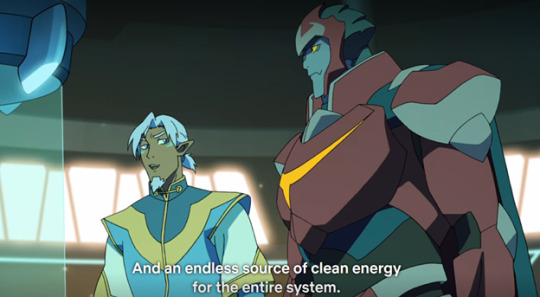
After the rift creatures nearly destroy Daibazaal, intentions change.

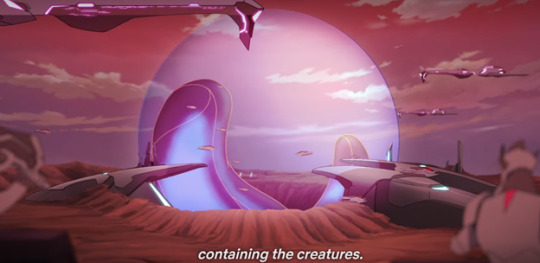
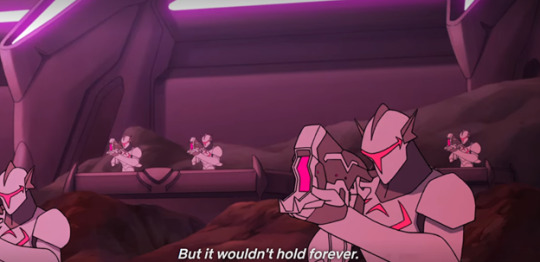
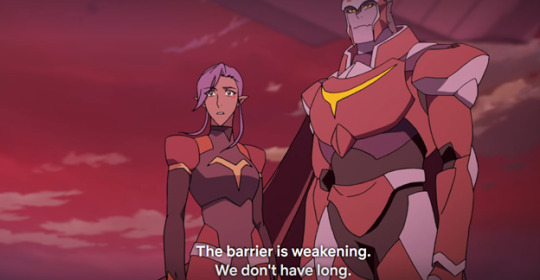

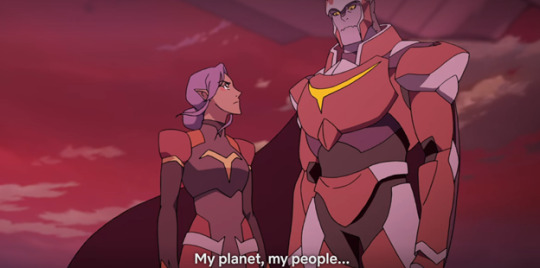

So here, we see the game change in a BIG way. Voltron is not just about offering a more renewable way of sustaining peace-keeping efforts. Alfor is now adjusting and finishing these ships with the explicit knowledge that if they are not powerful enough, then Daibazaal and the Galran people will die. Alfor’s got a LOT of pressure on him now to deliver a mighty and powerful weapon to stop this new threat. So even his creation of Voltron as a superweapon involved using it to protect people from imminent death—not to police them.
And about Alfor blowing up Daibazaal—once again, it’s Alfor trying to clean up Honerva and Zarkon’s mess. Honerva had convinced Zarkon that the rift needed to be wider, and so Zarkon deceived the paladins into widening it.
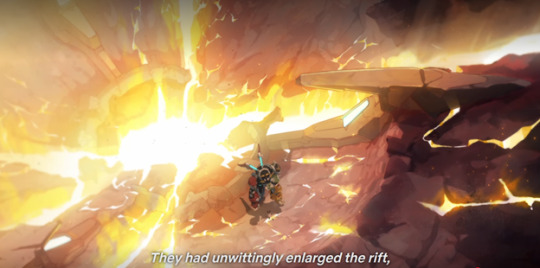

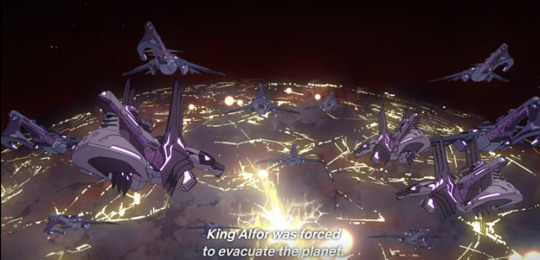
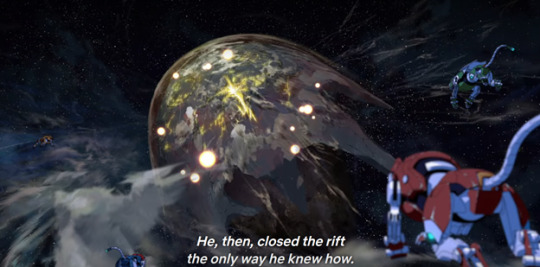

So keep in mind here, at this point in time—the rift was destabilizing and eating an entire planet. The entire universe was now at stake. Alfor had to choose between a bad fix and an even worse option of allowing everyone to die, but he very clearly evacuated people before destroying Daibazaal, as part of his promise to keep Galrans safe. So that no one would have to die.
And as a matter of fact—about that terraforming technology. How sure are you that Alfor didn’t intend to use it to build Galrans a new home? It’s entirely within the realm of acceptable conjecture that he allowed for the existence of that technology because it could restore what had been lost.
And here’s where the story gets really screwy and feeds into some anti hate. Because when Zarkon wakes up as a zombie, he desires more quintessence as zombies do.
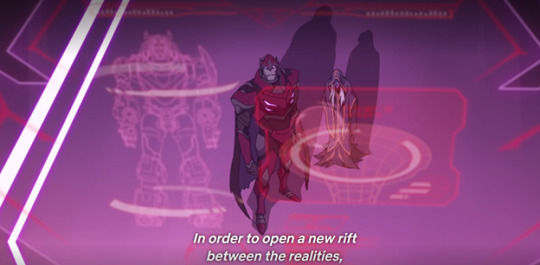

So he’s pissed that Alfor just cut off his gateway, and he manipulates his people:


And it’s here where we get the idea that Alfor was an evil controller. The idea came from Zarkon, who—we can look around pretty easily and see that he was not a man of honor, ultimately. Even if you chose to not believe the s3 finale flashbacks as being objective, there’s something wrong with Zarkon. (It’s clear that the show thought using Coran was a smart way to shell off massive amounts of info, because clearly if this were truly in Coran’s perspective, we would NOT have had intimate looks into Zarkon and Honerva’s bedroom as Zarkon is tending to her, like omg.) Numerous sources, histories, and cultures outside of Coran confirm that Zarkon hit a point of no return on the evil scale, and that he projected his own blame for Daibazaal’s destabilization onto Alfor in order to raise up his new regime in the name of Quintessence™.
So at the end of the day, even Alfor was a victim. But yet somehow, various antis choose to believe Zarkon’s victim-punishing narrative because said antis can’t or else refuse to connect one scene to another since it undermines their justifications for why they can hate on Allura. And that’s not so much an issue with the story itself as it is just poor critical analysis or malicious weaponization of content against other fans.
Now, at this point, we’ve talked about Allura and we’ve talked about Altean history. I have numerous other posts about Allura’s interactions with other races and Galrans and overcoming trauma to give the entire universe a second chance. So if there is anything in this show that suggests Alteans were in any way a superior race, then it’s probably within the show’s own worldbuilding. The show contradicts its own definitions of what quintessence even is by suggesting Alteans have “bluer/purer quintessence” in order to justify why Lotor would even be trying to sacrifice them for anything. The show-championed concept that Alteans have a bluer, purer life force above all other people, and that only Altean energy could interface with the fabric of space-time. Now, this is a problem in the later seasons’ world building itself. And you know who wrote that in? The production team. So once again, we do have racial issues in this show, in ways that shows like Star Wars desperately try avoid by showing racial diversity in who has Midi-chlorians.
That said, I’m not a perfectly woke storyteller either. I think every story and show is going to have something problematic™, but with VLD it’s very clear that its disrespectful handling of genocide politics and shatterglass conspiracy theories, on top of its weird master race angle created the perfect storm. These mishandled and quirky details have created a cognitive dissonance with the provided narrative, resulting in some people in the anti fandoms to champion what aligns very closely to actual neo-Nazi propaganda against Jews, who according to them are not victims but instead the true perpetrators of all bad things. For the sake of the antis, I’m pretty sure they’re not intentionally looking at VLD this way and are probably just looking for any easily graspable reason to hate on Allura for interfering with their ship or something.
But this kind of subliminal propaganda that undermines victims, and the effect it has had on fandom morality politics, is deeply concerning to me. I really wish that we’d had an opportunity to respectfully and critically discuss this with the production team of the show, because a Y7-FV show about “strength in unity” should NOT result in us needing to have a conversation about people walking away with neo-Nazi-ish propaganda sentiments against genocide survivors. Like. Clearly, VLD is fictional, but it’s feeding into a real-life beast that it does NOT need to feed. And it’s keeping alive ongoing conspiracy narratives against some of our most vulnerable populations on the planet.
So, we need better stories. We need a production team that, if they’re going to get paid to do something involving portrayals of genocide and politics, that they need to do their research on those topics. Nobody is going to be perfect with a creation, but VLD validated some very damaging things—and it ALL is something that could have been fixable. I think it would have been incredibly validating to hear the production talk about and accept that these were issues that cropped up unintentionally, and to hear them confirm that these issues are not the sorts of things that VLD was supposed to champion.
The greatest tragedy of all of this is the potential that this show had to really champion some great and validating messages, and the potential that we as a fandom had to come together and do something that fandom was meant to do—which was celebrate the things we love. Because that’s why we’re all here. That’s why this crazy tumblr of mine even exists. It was supposed to celebrate things.
For that reason, I’m going to end this here. I’ve written several responses now as to my thoughts on the inappropriate narrative lens of the show, its contradictory and damaging worldbuilding about the purest race, and how it champions demonizing or punishing genocide survivors again and again. Within all of that, I’ve talked at length about Allura’s character and behavior over 8 seasons and how she built even empathetic connections with militant Galrans like Commander Lahn. In fact even her own homesickness is how she emotionally connects with Lahn, because she understands that desire to call something one’s own. To have a home. A family.
I now really would like to get back to writing stories that I find meaningful to me using these characters and these worlds—and trying to find the hope in all of this darkness, haha. And maybe with any luck, I can hope to do VLD some justice, knowing that I am still on a learning journey as well.
But I appreciate your note, and I hope this very extensive response helps to settle your questions and concerns once and for all regarding VLD Allura. If you should have any remaining questions, please feel free to reach out via a private message to discuss. Thank you!
#Volron#VLD#Allura#VLD Critical#Alfor#Zarkon#Honerva#Lotor#I hope this helps explain my perspective#I think this might have to be my last refutation to the Allura as racist/racist supremacist conspiracy theory#at a certain point#people either watch the show holistically or they don't#you can't convince an anti#so this meta will probably not help an anti#but if you're sitting on the fence and felt drawn in by anti propaganda#then I hope that maybe this post provides an alternate perspective#and one that tries to be more holistically fair to all 8 seasons of the show#and to the intentions and general oversights that can occur during production#Ultimately it doesn't matter if someone likes or dislikes Allura as a fictional character#we need better entertainment that can handle these hard topics and handle them well#And we also need a fandom who's willing to look at all of the information and not weaponize it to specifically demonize and silence others#Maybe a family TV show shouldn't be appropriating conspiracy theories from the Protocols of the Elders of Zion#real-world fans are incredibly vulnerable to such conspiracy theories#and it creates a lot of real-world strife as a result
19 notes
·
View notes
Note
fawks: 16, 46, 58, 64 + kass: 10, 15, 57, 69 (IF THIS IS TOO MANY, feel free to only choose a handful lmaoooo... i am just curious!!!)
FAWKS
16. what are their feelings on the people who raised them?
it’s extremely Complicated!!! I think fawks does love her family, but feels like there’s a lot of baggage there--she never felt like she was good enough for her mom and that a lot of her love was conditional on fawks’ ability to achieve and in particular to meet expectations on how she should act as a member of her well-known family. becoming a professor in the shadow of her parents’ illustrious academic careers only exacerbated that situation. I think some of the tension with her mom is based on the fact they didn’t really understand each other and that they both stopped trying after a certain point, but there is still the possibility they could reconcile someday since none of that distance came out of a place of true anger.
fawks’ relationship with her dad is more straightforward, as her dad was much more supportive of her interests and made an effort to ensure she could pursue them. at the same time, though, he was always pulled between her and her mom, and I think fawks also never really allowed herself to be super open with him because she was afraid whose side he’d take if she ever did burn bridges permanently.
46. what do they deprive themself of?
HMMMMM not surprising but she deprives herself of emotional intimacy, and probably even of a connection with her own feelings. she’s become very self-reliant as a coping strategy, but that does also mean she avoids dwelling on her negative emotions and tries to distance herself from them. which is! not neccessarily a healthy way to deal with them! I think she’s getting better at...trying to wrestle with them and being more open/trusting with people on her feelings, but it is still very hard for her.
58. what do they think their role in the party is? what is their role in actuality?
LMAO I think at her best fawks likes to think of herself as one of the idea people and a leader of sorts for that reason, since she has such a strong perspective and is also more than a little full of herself. in reality though, I think maybe she more contributes to like...spontaneity and a willingness to be curious and inquisitive, to follow your passions and the joy they bring you. idk what exact ~role that is, but she definitely is all about being true to yourself and I think encourages the party to be too just based on her own enthusiasm for it.
64. do they value mercy or justice more?
JUSTICE FOR SURE. her way of thinking is very black and white. I think she has the capacity to be moved towards mercy/forgiveness, but she’s much more likely to think people deserve the consequences they are given (which has made the whole situation with the black dragon weigh on her more--she thinks she deserves some type of punishment for her mistake).
KASS
10. how often do they lie? what situations cause them to be dishonest?
why would you ask kass, a spy, this? :)
LMAO but in seriousness, kass does of course have a more free-wheeling approach to telling the truth than most. he has no problem with lying to achieve his own ends, particularly when he believes it’s for something important/some type of mission. he also does not neccessarily have an issue with telling white lies if he believes it will help someone (or at the very least, not do them any ill).
THAT ALL BEING SAID, I think he holds himself to a pretty high standard of being truthful with people when he has no reason not to be. kass greatly values honesty given the nature of his profession, and he tries to be genuine with both friends/allies and strangers when he has the luxury of doing so. the only time he’d lie to someone close to him is if he thought it would protect them--he definitely does not have an inherent desire to deceive or manipulate anyone, and I think at his heart definitely prefers to engage openly with people.
15. do they trust their party? why or why not?
not to get TOO into the weeds about his ~complicated morality since we covered that with the last question, but I don’t think think trust is very straightforward with kass. he’s used to watching his own back and holds most people at arms’ length because true friends in the zhents are hard to come by. he trusts the party insomuch as he doesn’t have any reason to believe they’d betray him at the present moment, or cut and run if things went south (since they very much did the session he almost got killed LOL). but I don’t think he trusts that this will always be the case, even though he likes the party a lot. the one exception is probably pierce, given their history--like obviously he understands pierce wouldn’t stand for him messing with the party for zhent business (like that’s valid lmao), but he trusts implicitly that pierce will stick with him through hell, since pierce already has proven he will.
57. what makes them angry?
kass is very hard to make genuinely angry! his temper has a long fuse, and when he does get upset, it’s usually a burst of emotion that he quickly gets over once the situation has been addressed. one thing that will always make him furious though, given his past, is the issue of wealth disparity (and particularly its effects on children). he generally has no love for nobles for this reason. kass also hates cruel people and bullies, which has definitely made working for the zhentarim...difficult at times.
69. how would they describe their party members?
gwen: “gwen is one of my very favorite people I’ve met recently! she is very tenacious, to have come to the underdark with us for the first time on this mission and kept going even with everything we’ve faced. I think she does not give herself enough credit for how strong she truly is. she seems to be weighed down by her past, and I hope she can leave it behind with time--she seems freer when she does what she wants to do, rather than what is expected of her. she is also incredibly smart--I stand by the ratapult being a work of true genius.”
jolene: “jolene is, I think, a bit more than she likes to project. she is definitely bold and a force to be reckoned with when she puts her mind to something, and both a skilled fighter and musician, which is truly enviable! but I think she tries to hide that her passion comes from a place of caring deeply about her friends like pierce...but I suppose I could be wrong, as we have not known each other for too long. what I do know? her leather jacket is far superior to any other I’ve seen, as is much of her style. oh also! I don’t understand her relationship with the void, but I have a healthy respect for it.”
pierce: “ahhh, it is hard to come up with the best words to describe pierce. he would probably hate to hear me sing his praises, but he is definitely one of the most true men I have ever known--he is the rare breed that tries to always do what’s right for no reason but because it’s the right thing to do, who chooses what is good over what is easy. and he has been that way even since we were kids. I don’t think he values himself enough for that, and I’d like to see him one day really realize his own worth. I do want to know more about what happened to him in the time since we lost contact--he has always been an anxious person, but I wonder if something happened during those years that is still affecting him...also, on a lighter note, he died and came back as a halfling? which I am still wrapping my head around.”
3 notes
·
View notes
Text
Azula and redemption.
So … this is going to be a bit of a mess. I’m undoubtedly going to say a lot of things in this post that I’ll end up re-phrasing later. Apologies, because this got long-ish.
I will repeat that I don’t have access to the Avatar comics, and that I’m not interested in material from them. You may quote me as saying that, as of this post, the comics are not canon so far as I’m concerned. (The same goes for Legend of Korra, but I’ll talk more about that elsewhere.)
The character of Azula is one that a lot of people in this fandom find really compelling, yours truly included. She’s clever and calculating. She plays the long game, and she plays to win. She lets nothing get in the way of her goals. She’s an incredibly powerful firebender, arguably the most powerful we get to see in close focus; and there’s a beauty to her bending that makes her just a pleasure to watch. She’s got some of the wittiest lines. And #girlboss, I guess. She’s the unquestioned leader of a trio of incredibly accomplished young girls. On some level, we have no choice but to stan.
It is also true that Ozai’s treatment of her is abusive, and has damaged her deeply. When he had no more use for her in “Sozin’s Comet: The Phoenix King,” he cast her aside without a second thought, saddling her with a title that he rendered meaningless with his whole “Phoenix King” stunt, thus sending her spiraling into a psychotic break. He might praise her for being “a true prodigy,” but clearly her obsession with perfection was something that he passed on to her, or instilled in her, or both. She also appears to have had the closer and more “affirmative” relationship with him (whereas Zuko’s closer and more “affirmative” relationship was with Ursa), and that relationship has molded her into someone who is, at her core, deeply afraid.
But as much as Azula is afraid, Azula is also cruel. With the exception of her father and master, she seems to value the lives of the people around her purely in terms of what they can get her or accomplish for her. And while Ozai may have nurtured these things in her, I also think that, to some extent, those traits were already there in ways that they weren’t there for Zuko.
Now, a lot of Azula-defenders will say that the glimpses of Azula that we see in “Zuko Alone” should not be taken as gospel truth, that we are trusting an unreliable narrator. But I argue that a nine-year-old Azula who bodily throws Ty Lee on the ground and then points and laughs at her because Ty Lee had the nerve to perform a backflip better than she could is not inconsistent with a fourteen-year-old Azula who is willing to order Ty Lee’s safety set net on fire and all the dangerous circus beasts simultaneously turned loose while she’s suspended in the air (thus endangering Ty Lee’s life and the lives of all the patrons), just because Ty Lee had the nerve to initially say no to joining her. A nine-year-old Azula who sets an apple atop Mai’s head on fire just to get Zuko to embarrass Mai by pushing her into a fountain is not inconsistent with a fourteen-year-old Azula who plays with the life of Mai’s toddling brother in Mai’s presence in order to keep king Bumi captive. And an eleven-year-old Azula who smiles while her father burns her brother’s face is not inconsistent with a fourteen-year-old Azula who is willing to throw lightning at him with no knowledge of the existence of lightning redirection and who is willing to put a bounty on him dead or alive.
I think, like a great many other people in the fandom do, that Azula not only has less empathy than is “the norm,” but also more cruelty (the two are NOT synonymous). In fact, I think that this lack of empathy and relatively high cruelty was part of what Ozai admired and refined in Azula, it wasn’t just her firebending. See, I think people who say that Ozai favored Azula just because she was a firebending prodigy are a little off the mark: if Azula had been a firebending prodigy but had the same kind of “you-can’t-sacrifice-the-lives-of-our-loyal-soldiers”/ “Uncle-deserves-sympathy-his-only-kid’s-dead” attitude that Zuko had, Ozai would have had a lot less to work with. Azula is unquestionably an abuse victim, but she is also herself an abuser: of Ty Lee, of Mai, of Zuko, of the soldiers and servants beneath her.
To be blunt: Ozai may have shaped and encouraged her crueler traits, but I don’t think he put them in her. Not entirely.
Now I wanted to talk about the cruelty issue with Azula because it’s important to how I see a good Azula redemption arc taking place. Now Aaron Ehasz may believe that Zuko is best suited to be the key for Azula’s redemption, but I disagree very strongly. Azula was also an abuser of Zuko, and I think that making Zuko the one to power her through it with Love would be terrible. What’s the point of Zuko so powerfully standing up to his father and calling him out on his abuse if Zuko’s also supposed to be the one to “save” his secondary abuser?
(As an aside: this is also my big objection to Tyzula, which is alarmingly common in fanwork. I mean, Ty Lee is arguably Azula’s most explicit victim, and the one most clearly afraid of Azula. What on God’s green earth made that ship so popular that their voice actresses ended up doing a scene in one proposed to the other?! Was it the scene at the party? Because if so, I think it’s rich that Azula’s one and only canon apology is for saying something rude but probably true, while never apologizing for that one time she endangered Ty Lee’s life and snatched away the circus career that she’d tried to build for herself.)
An Azula redemption just wouldn’t follow the same road as Zuko’s redemption did. It wouldn’t just be a matter of Azula learning that she doesn’t have to be perfect to be worthy of love. It wouldn’t just be a matter of learning that the way her father treated her was wrong and bad. It wouldn’t even just be a matter of learning that fear is not, in fact, the only reliable way to have relationships with people. It would be a matter of learning to see people other than herself as persons and not tools to get her things. It would be a matter of learning that her own sense of inherent superiority (both national and personal) is without merit. It would be a matter of learning that the suffering of other people is actually Not A Good and that she probably shouldn’t cause it for fun.
(Plus, I’m gonna be honest, I don’t honestly know how possible it would be for Azula to internalize these things because, as I’ve said, the cruelty and tendency towards manipulation seem to be just a part of her.)
Oh, and also: I’ve heard people say that Azula should have had a redemption arc within ATLA, or that an Azula redemption was one of the many things we were cheated in that we never got a Book 4. But I really think a meaningful redemption arc for Azula would take much, much longer than a single season. I mean, it took three books to complete a redemption arc for Zuko, and at the beginning of his, he was in a much more receptive place than Azula is after the Agni Kai. And Azula has more destructive ideas to unlearn than Zuko did.
So, do I think Azula is a “monster,” whatever that means? Do I think she doesn’t “deserve” redemption? No. I’m also aware that she’s just fourteen, and a lot of things can change during one’s teen years. But I do think that Azula is one of those cases where the abused has also become an abuser in her own right, and a meaningful redemption for her is rather a bigger undertaking than some of her fans and defenders acknowledge. And for God’s sake, don’t make Zuko or Ty Lee responsible for her redemption!!
Post-mortem: Also, about the dragons: I get the appeal of the dragons as an element of Azula’s redemption. Especially after Game of Thrones, I’d love to have a functional, badass, not-dead dragon-lady too. But “The Firebending Masters” told us that Ran and Shaw incinerate you if they don’t find you worthy, which is bad news for a firebender who’s all about power and domination rather than guardianship and life-igniting (there’s a better way to say that, I’m sure). If Ran and Shaw were involved in an Azula redemptive journey, it would have to be near or at the end, just to avoid the incinerating.
28 notes
·
View notes
Text
Normal Has Crashed and Burned: Comparing Sam & Caine in Gone
The standards of what’s considered “normal” vary from society to society, which often makes them hard to define, much less live up to. The first book of the Gone series raises questions about whether or not being normal really matters when the rules that govern a society are rewritten entirely. As any Gone fan knows, the kids of Perdido Beach have to rebuild society from the ground up when all of the adults in their town mysteriously disappear. Most of this rebuilding is done by Sam and Caine, who both use their mutant powers and the respect that they’ve earned from the other FAYZ kids to ascend to a position of power. However, both of them have very different ideas about what this new society should look like. In the first book of the Gone series, Sam wants things to stay the way they were before the FAYZ began, while Caine wants to change things. This is because Sam felt as though he belonged in the normal world and Caine didn’t. This is apparent through how they feel about their superpowers, their relationships with their girlfriends, and their views on the concept of family.
In the first book, Sam and Caine’s mutant powers serve as a symbol for the political power that they have over the FAYZ. In the later books, non-mutant characters start gaining more influence over political affairs. However, in the first book, Sam and Caine’s status as four bars gives them the ability to perform the sort of impressive feats that get the FAYZ kids to listen to them. This is interesting because both Sam and Caine are afraid of mutant powers, but they both have very different reasons for this fear. Sam is afraid of having too much power himself, while Caine is afraid of other people having power. In a conversation with Astrid in Chapter 28, Sam frames his own reluctance to use his powers as a simple desire not hurt innocent people. However, readers can infer from the fact that Sam is even reluctant to use it against objectively terrible people like Drake and Caine at first, that the real truth is more complicated than that. Sam’s fear stems from a very specific event in his life when he burnt off his step father’s hand after he caught him trying to abuse his mother. While this did save Connie from getting hurt, it completely shattered the image he had of his family as normal. Additionally, after this happened, he had to move to a significantly worse neighborhood when the incident caused Connie and his stepfather to get divorced. This implies that Sam’s fear of using his powers, even against a bad person, comes from a fear of ruining the stability of his life again. To add to his fear, Sam’s powers make him different from the people around him. Quinn’s jealousy of Sam’s powers is one thing that causes him to betray Sam in favor of Caine in the middle of the book.
Meanwhile, Caine’s fear of other people having powers wasn’t the result of a specific event. Instead, it stems from his own insecurities. When he went to Coates, “Caine had just been determined to be the head bully, the bully who could not be bullied himself.” (Grant, 503) This implies that even before the FAYZ started, Caine hurt others because he was afraid that if he didn’t, then they would hurt him first. This also connects to his decision to plaster all of the mutants. Obviously, he did not target the mutants because he thought that there was anything wrong with them since he is so proud of his own powers. He plastered them so that he could be the most powerful person in the FAYZ. This proves that his terrible actions are motivated by fear and insecurity, not sadistic pleasure. This insecurity comes from his belief that he never belonged in the normal world that existed before the FAYZ. In chapter 45, Caine tells Sam that had to create himself because he grew up without knowing who he was. This suggests that he had always felt isolated. First with his adopted family, and then later when he got sent off to Coates. These feelings of isolation led him to feel as though he was the only one that he could rely on. So, after the FAYZ begins, he wants all of the power for himself so that he can destroy the old society and create a new one where he has total control.
Like Caine, Sam also searches for a sense of belonging in the FAYZ. However, that sense of belonging comes from his relationship with Astrid, not political power. While Sam and Astrid may seem like a surprising couple because the two of them are so different from each other, it actually makes a lot of sense why Sam would be so infatuated with her. Being “Astrid the Genius,” she knows a lot about every academic subject, but the one that she uses to most effectively comfort the people around her is US History. Over the course of the story, she uses quotes from both Franklin D. Roosevelt and Abraham Lincoln to make Sam feel better about taking on a leadership role. Both of these people are significant figures who played an important role in making the normal world that existed before the FAYZ what it was. So, by using their words to help Sam make important decisions, Astrid becomes a comforting presence that helps him actively recreate the normal world in the FAYZ.
Diana plays a similar role in Caine’s life, but he reacts much more negatively to her attempts to help him make good leadership decisions. Unlike Sam, who views Astrid as his girlfriend first and foremost, Caine views Diana primarily as an accomplice. That means that even his attempts at romantic interactions with her end up having the same domineering tone as his interactions with his followers. However, while there’s no denying that there’s a strong power imbalance between the two of them, Diana is the only one of Caine’s followers who comes close to being on equal footing with him in this book. The reason that Caine tolerates teasing from Diana that he wouldn’t tolerate from anyone else is that she’s the only one who refuses to see him as extraordinary. She isn’t completely enthralled by his manipulation, but she doesn’t view him as a terrifyingly evil person who is too dangerous to get close to either. This is a large part of the reason why Caine has feelings for her because it is the closest he can get to feeling like a normal person. However, it also absolutely terrifies him, because he’s trying to completely reject all forms of normality in favor of being exceptional.
While it’s clear that Caine views himself as someone who is superior to normal people, Sam seems to want nothing more than to go back to being the same regular guy that he was before the FAYZ. It’s obvious from the beginning of the story that Sam’s classmates never viewed him as someone who is more extraordinary than the average person. This is apparent in the way that they all still call him School Bus Sam as a reminder of the time he saved the lives of his classmates before the beginning of the series. However, in spite of this, Sam still felt normal because he had positive relationships with his friends and his family. Even though Quinn was his only real friend at the start of the FAYZ and Connie was the only family that he had, he still had very good relationships with both of them. The sense of belonging that his healthy relationships gave him caused him to feel like he had a place in society and, in turn, was normal. This is why when the appearance of the dome literally took Connie away from him and put stress on his friendship with Quinn, Sam felt so lost and confused
In contrast, Caine was excited when the FAYZ began because it gave him an opportunity to thrive. Unlike most of the other kids in the FAYZ, Caine didn’t lose anyone important to him when all of the adults disappeared. Caine states multiple times throughout the book that he never felt any sort of real connection with his adopted parents. The fact that they sent him off to Coates implies that they didn’t care very much about him, either. Additionally, Caine’s connections with his followers aren’t real friendships because, with the exception of Diana, he only sees them in terms of how useful they are to him. As stated earlier, he even tries to reduce his relationship with Diana to the same sort of exploitative relationship that he has with the rest of his followers, in spite of his feelings for her, in order to feel as though he is in control of his life. The fact that Caine was never able to feel like he truly belonged in society because he never had a genuine support system led him to feel as though he was not normal. Caine responded to these feelings of isolation by embracing the fact that wasn’t normal. Instead of doing that in a healthy way, he did this by convincing himself that he was superior to other people.
In the end, both Sam and Caine have opposite perspectives on the concept of normality. Sam is used to feeling like he is normal because he felt like he belonged in society. Meanwhile, Caine lacked any genuine connections with the other people in his life. So, he completely rejected the concept of normality using his manipulation and violence to create an illusion of superiority. These different perspectives on normality also give Caine and Sam different perspectives on what they should do to maintain order after the FAYZ begins. Sam believes that preserving the morals and rules of the old society is the best thing to do because the old society benefitted him. Contrarily, Caine did not feel like the old society benefitted him. So, he chose to build a new one that he thought would give him complete control over the world around him. He did this without any regard for how it would impact other people because of his lack of positive connections with other people gave him no reason to care about their wellbeing.
Sam and Caine’s actions are motivated by their different perspectives on society, instead of inherent goodness or badness, which makes them both more complex characters. While one brother is clearly a hero and the other is clearly a villain, they have both complicated motivations for filling these roles. This makes it believable when both of them (but especially Caine) begin to break out of these archetypical roles in later books. It also allows readers to sympathize with both of the brothers. This is why so many Gone fans like to identify themselves as “Team Sam” or “Team Caine.” Many people, like Sam, believe that fitting in with others is a good thing because of the sense of community it provides, and as a result, don’t want to see anything happen to the society that has given them a sense of belonging and community. On the other hand, there are also those of us who have felt isolated from or rejected by the people around them, which has made them want to try and create a system that benefits them. Neither side is completely right, or completely wrong, which adds a philosophical element to one of the oldest debates in the Gone fandom.
So, which one are you? Team Sam? Or Team Caine? The answer might reveal more about yourself than you think.
21 notes
·
View notes
Text
The Woman Who Fell To Earth - Doctor Who blog (Change, my dear. And it seems not a moment too soon)
(SPOILER WARNING: The following is an in-depth critical analysis. If you haven’t seen this episode yet, you may want to before reading this review)

Never before have I gone into a Doctor Who episode with such a mixture of excitement and dread as I did with The Woman Who Fell To Earth. On the one hand we’ve finally got a female Doctor, something most Whovians have been waiting decades for, but on the other hand she’s being written by Chris Chibnall, a writer who (and let’s be generous here) has never exactly managed to win me over in the past. His past Doctor Who episodes were often derivative, stupid and poorly written and while yes he did create Broadchurch (a show that people assure me is good, but I still have little to no interest in watching), he was also the showrunner of the god awful spinoff Torchwood, which was essentially Doctor Who’s Suicide Squad.
So yeah, the thought of him sitting in the driver’s seat and at such a crucial moment in Doctor Who’s long history didn’t exactly get me hyped for the new series and if I’m honest, come Sunday 7th October, I was bracing myself for the worst.
Then the most pleasant of surprises. The Woman Who Fell To Earth turned out to be really, really good. I’m actually gobsmacked by how much I enjoyed this episode. I never thought I’d see the day where I’d be praising a Chibnall episode, but here we are.
I think one of the reasons why I enjoyed this episode so much is because it feels like all the aspects that annoyed me about RTD and Moffat’s respective eras have been sheared away. There’s no convoluted plots. No dangling arcs. No forced whimsy. No smart arse dialogue or pretentious speeches. In fact this had a lot more in common with a classic series story in terms of its pacing and scale. It’s not some global threat where everyone is dashing about like headless chickens on speed. The threat is contained to one town in Northern England where only a handful of people are in danger. Even the music has mercifully been restrained. While I do have a fondness for Murray Gold’s work on Doctor Who, his music often had a tendency to go too overboard, bombarding the senses and drowning the audience in slush. New composer Segun Akinola offers a much more subtle and moving score. It enhances the action and certain emotional moments without bashing you over the head and, crucially, Akinola knows when to shut up and let the actors carry the scene.
I must say it’s such a relief to see some humanity injected back into Doctor Who again. After years of convoluted, timey wimey Moffat nonsense, Chibnall has had the good sense to bring everything back to basics. It’s not about the aliens, the special effects, the exotic locations or the overly pretentious plots that require a fucking flow chart in order to make sense of them. It’s all about the characters. And what wonderful characters they are. Ensemble casts rarely work on Doctor Who, but I have to say I really like this cast. Out of all the new companions, Ryan is probably my favourite. Tosin Cole gives a really good performance and I really like how he’s written. In particular I like how the episode portrays his dyspraxia. The way New Who has handled things like disability and mental health in the past has left a lot to be desired, but here Chibnall gets it just right. He never makes a big thing out of it and the episode never comes across as patronising or condescending. It’s treated like any other character trait, which is exactly how it should be.
Mandip Gill is also good as Yasmin Khan, a police officer who feels like she’s not getting the most out of her life or career. She reminds me slightly of Rose Tyler, but unlike Rose, Yasmin is more proactive. She doesn’t sit around waiting for something to happen. She pursues new opportunities when they come up and gets frustrated when someone puts a wall in front of her. It’ll be interesting to see how she’ll adapt to time travel over the course of the series.
And then there’s Graham, played by Bradley Walsh. To all my non-British readers, let me give you a quick education on the wonders that is Mr. Walsh. He’s one of our most versatile performers. He’s been a footballer, a comedian, an actor and a gameshow host. He’s an incredibly funny man as well as a great dramatic performer. Having seen him in Law & Order UK, I knew he’d be perfect and he didn’t disappoint. There’s a weariness to him that’s incredibly charming and likeable, but then he’s able to go from comedic to emotional at the drop of a hat. The eulogy he gives at Grace’s funeral was incredibly powerful and moving, as are the moments where he tries to bond with Ryan, who’s clearly sceptical of any kind of father figure in his life due to how unreliable his dad is. Both Graham and Ryan are the ones to keep a close eye on I think. Ryan in particular will be carrying a lot of baggage as the series progresses. His determination to ride a bike shows not only the pain he feels toward losing his Nan, but also the guilt. If he hadn’t lost his temper, chucked his bike down a cliff and then pressed the weird glowing shapes, none of this would have happened. He clearly feels he’s responsible for her death and I’m looking forward to seeing not only how he grows and moves on from that, but also how Graham will step up and help him, being the grandfather Ryan needs if not necessarily the one he wants.
It’s the characterisation that is The Woman Who Fell To Earth’s greatest strength. Not just the from the main cast, but the supporting characters too. Little moments like the old man telling his granddaughter he loves her before getting killed by the Stenza or the crane operator listening to self motivation tapes is what gives this episode more depth and soul. And then of course there’s Grace, played wonderfully by Sharon D. Clarke. I’m hard pressed to think of a single character from the Moffat era that I gave anything resembling a shit about, which is why it’s so remarkable that I’m able to care this much about Grace despite the short time we get to know her. She’s caring, supportive and energetic. She feels like the perfect companion for the Doctor and I would have loved to have seen her in the TARDIS with everyone else, which is what makes her death so heartbreaking. She’s not some random redshirt getting axed because the script requires more tension. She’s a three dimensional character we really like coming to a tragic end.
Okay. Okay. Let’s get to the main topic of conversation. How’s the new Doctor? Have the ‘feminazis’ ruined it? Is she swapping makeup tips with the Cybermen? Is she struggling to parallel park the TARDIS? Did she accidentally kill a whole species because it was her time of the month? (these are all things I’ve seriously heard butthurt fanboys say since Jodie Whittaker was cast and I think we can all agree it’s beyond pathetic). Well, quelle surprise, turns out the Doctor’s sex change didn’t jumpstart the SJW apocalypse after all. Who’d have thought women could be Doctors too? What a novel concept.
The minute she fell into the train, I was sold. Whereas Peter Capaldi took three whole series to finally come into his own (not that Capaldi is necessarily to blame for that. Blame the monkey at the fucking typewriter for that one), with Jodie Whittaker it’s instantaneous. She is the Doctor.
It helps that Chibnall largely dispenses with all the usual post-regeneration bullshit. With the fainting and gurning kept to a minimum, we can get on with actually learning about this new Doctor and I love what I’m seeing so far. She’s quick-witted, compassionate and quirky, but not to the point where it becomes annoying like Matt Smith’s often did (in my opinion. Tastes differ, obviously. I personally found Eleven to be unbearable at times). After the Twelfth Doctor, with his borderline misanthropy and his inability to even so much as blow his nose without a companion to hold his hand, Thirteen comes like a breath of fresh air.
One thing I especially like about her is her complete lack of arrogance and boring machismo that previous New Who Doctors were sometimes guilty of. Rather than having her boast about how clever she is, like Ten or Eleven would have, she just shows us by building a new sonic screwdriver out of spoons. And she never tries to lord her moral superiority over others. Quite the opposite in fact. This is a Doctor who clearly values teamwork and can recognise strength in others. There are flashes of darkness too, like when she manipulates the Stenza into killing himself with his own DNA bombs, but she’s not driven by some inherent belief that she is right and they are wrong. She’s driven by the fact that she has gotten to know these people and doesn’t want anything to happen to them. Thirteen is quite possibly one of the most down to earth Doctors I’ve ever seen and I’m extremely excited to see more.
As I said, The Woman Who Fell To Earth is largely about its characters, which is just as well because the plot is... I wouldn’t say it’s bad, but it’s definitely the least interesting thing about the episode. I liked the look of the Stenza, with the teeth embedded in his face, and the gathering coil. I liked that it was a small scale threat and largely self contained, and I liked the way the plot slowly unfolds over the course of the story. However it is a bit derivative. The Stenza is pretty much a PG-13 version of the Predator and he is a bit one note. That being said, it doesn’t detract from the enjoyment factor of the episode. By keeping the plot simple for the most part, it allows Chibnall to fully explore the characters, who are clearly supposed to be the main focus.
In short, I’m pleased to say that I really liked Chris Chibnall’s first offering as showrunner (never thought I’d ever type this). The Woman Who Fell To Earth is without a doubt one of the most confident starts to a new Doctor I’ve ever seen and I’m very much anticipating where the series goes from here. For the first time, in a long time, I’m excited for the next Doctor Who adventure :D
(Oh, btw, all those idiots who were saying that Doctor Who’s ratings have been falling and that a female Doctor would kill the show off, so far this series the ratings have been at its highest since the show came back in 2005. Guess the reason why the ratings were low during the Moffat era wasn’t because of the World Cup, warm weather, streaming television or SJW propoganda. It was because Steven Moffat is a really shit writer. Go figure)
#the woman who fell to earth#chris chibnall#doctor who#thirteenth doctor#jodie whittaker#graham o'brien#bradley walsh#yasmin khan#mandip gill#ryan sinclair#tosin cole#bbc#review#spoilers
55 notes
·
View notes
Text
Some thoughts on M!Lorca and Emperor Georgiou
I was reading some posts and thought that a greater exploration of these two characters and their respective villainy may be called for. The main thing I keep coming back to is: is it really so hard to accept that both mirror Georgiou and mirror Lorca are both pretty bad and neither of them should be “sided” with? The sins of one don’t cancel out the sins of the other, and they’re both horrible (albeit interesting) in their own special ways. I’m just sayin’, though Michael will probably have to make an alliance of opportunity at one point or another, neither of them is a “good” choice.
So let’s break it down a little, shall we?
Georgiou:
-eats sentient beings
-doesn’t hesitate to kill a room full of people
-is a-okay with torturing people for life
-may or may not be an overbearing, controlling mother-figure
-kills and subjugates alien races without a second thought
-rules the human population through terror
Big Evil Things all.
Lorca:
-possibly killed the entire crew of the prime Buran to cover his entry into the prime universe (arguably speculation at this point, but something weird happened there and lorca at the very least lied about his “eye injuries”)
-pushes his crew past their limits, jeopardizing their health
-orders Dr. Culber to fake a medical report
-pulls Dr. Culber away from taking care of Paul so he can’t figure out what happened (with an extra dose of gaslighting when Culber accuses him of planning their departure from the prime universe), therefore extending their stay in the mirror universe
-tries to manipulate Katrina Cornwell with sex and, when that fails, sends her into a dangerous situation hoping she will be captured or killed and refuses to help when it is confirmed she was kidnapped (what happened to his whole “i know what happens to people captured by klingons and not on my watch” spiel??)
-puts a traumatized p.o.w back into action without any therapy
-to avoid punishment (and complete his own personal mission) he inputs coordinates to take the Discovery to the MU, stranding his crew in hostile territory and erasing the last coordinates to keep them in the dark
-apparently manipulated a woman named Ava and used her until he was done with her before casting her aside or worse--and he has no remorse concerning his actions
-allegedly manipulated/had a relationship with mirror Michael, whom he must have known saw him as a father, and conspired with her to kill the emperor, her mother-figure (just sayin’, if the relationship bit is true, even if they aren’t technically related and she was an adult when a relationship began, that’s still super problematic. She still grew up under his care looking up to him as a father. The inherent power disparity there is stunning and unnerving. and regardless, her father-figure was helping mirror Michael plan the murder of her foster mother. just...wow)
-we don’t know if he wants to overthrow the emperor to make the empire a better place or just to usurp power. but we do know he was the right-hand man of the emperor, tasked with executing her most sensitive missions (which probably included mass murder on the reg), that he ran his ship in the prime universe like his own personal fiefdom and he didn’t think twice about telling michael to destroy the rebel base, no questions asked
(note, the lorca section is longer because we know more about lorca than we do about the emperor. To that end, I will include more commentary about lorca because, again, I’ve had more time to ponder lorca than evil georgiou)
Okay, so a lot of this might be excused(?) by arguing cultural relativism on behalf of the Terrans. Personally, I don’t think borderline incest is acceptable by any universe’s standards, but for the sake of argument I will agree that the source reporting this likely isn’t reliable and maybe that part isn’t true. But I don’t think Lorca is a “good guy” and unless some dramatic shift happens, I don’t think he should continue as captain.
From a certain perspective, Lorca may be said to have done a lot of good, too, and there are interesting arguments in favor of this. But I also think there’s another side to that coin, and I want to explore that a little more.
Look, Lorca has always struck me as an expert at manipulation. Expert manipulators know that it’s all a game of give-and-take, but they make sure to stack the deck in their favor when it’s their turn to take. They’re also extremely savvy when it comes to securing the loyalty of their followers.
Let’s look at some examples from Lorca’s stint on the Discovery using this theory as our guide.
Busting Michael out of prison? He didn’t do it solely for the pleasure of her company. He needed her for his own plans, as we now know. He also likely meant to cultivate a sense of indebtedness between him and her. When that didn’t go as planned, he had to change tactics and appeal to her curiosity and sense of duty to convince her to stay, a much softer but decidedly more effective approach. And Lorca, above anything else, cares about results, not how he gets them.
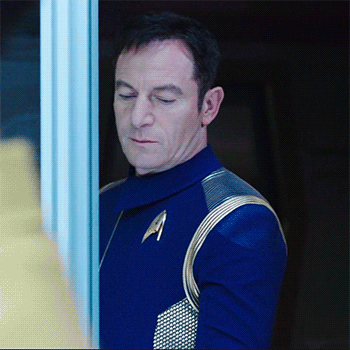
Rescuing Sarek? He knew that mission was important to Michael, sure, but he also predicted that allowing her to rescue Sarek would make her feel gratitude and loyalty to him as well as convince her to trust him (trust being one of the most basic and important tools a manipulator has to work with). When she thanked him for his support, he even said as much: “I need a group of people around me to carry the day”. He wants her steadfast loyalty and trust so she will follow him even when he’s doing things she knows aren’t strictly in keeping with Starfleet ideals.
Speaking of which, from the get-go he encouraged her to shift her thinking away from Starfleet’s diplomatic ideals and start thinking in a more zero-sum, militaristic way. She proves a little less pliable than he might have liked, but she trusts him enough that she ignores his underhanded tactics. Still, he has to step lightly around her because he doesn’t have full control of her yet and he knows it. That’s another reason why he has to bend to her will at times; if he pushes back too hard she might begin to question his motives and start to doubt him, and that can’t happen for his plan to work.
Another thing expert manipulators do is forge a sense of commonality between themselves and the target of their manipulation, emphasizing their mutual (but superior) “otherness” from the group. Lorca is quick to call Michael superior to the other Federation scientists around them because she, like himself, can think outside the box and do what needs to be done (”universal law is for lackeys; context is for kings”). They are members of an exclusive club, one that knows what’s really happening, what needs to be done, and the difficult means by which to do it; everyone else belongs to the lackey club that must be guided by their superior insight.
As for other “nice” things he’s done? Springing Tyler out of prison was a strategic decision. Tyler said it himself;
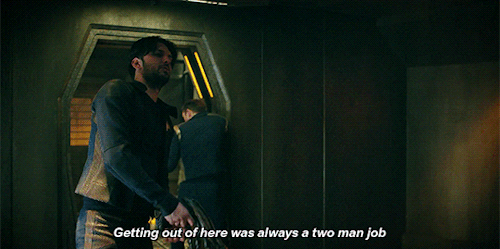
Lorca needed Tyler as much as Tyler needed him.
What about promoting Tyler and giving him a place among the crew? Look, if someone helped me escape a klingon prison hellhole after seven months of torture, I’d feel pretty fucking indebted to them. Lorca also knew that Tyler, like anyone who’s been through torture, would be anxious to get back at his tormentors and be prepared to break any rule to do it (see his conversation with Saru on Pavo).

I wouldn’t exactly call Lorca’s actions here altruistic, but rather a calculated risk, like most of his decisions.
He sounded pretty kind to Tilly when she was freaking out on the captain’s seat, but then again, yelling at her and making things worse would have blown their cover and made a mess of his grand plans, so... *shrug*
The thing that’s so insidious about Lorca, even assuming his intentions are “good” and his end-game somehow justifies the means, is that he’s so good at manipulating people and so incredibly deft at controlling the people around him that it really makes me question his true intentions or feelings about anything. He’s a long-term strategist who can pivot and adjust to any situation, which makes him an extremely interesting character. It’s easy to look at his actions in the moment and say they are good, but Lorca is a big-picture thinker who dons whatever hat he needs to fit the situation. For manipulative people, kindness and cruelty are both tools that must be used appropriately and in the right measure to get what they want. Particularly in the Federation, honey will catch more flies than vinegar, and he knows that.
I’m not saying that Lorca isn’t a fantastically dynamic character and that I haven’t enjoyed watching his arc. And I’m not saying he’s devoid of emotion either; he may have some passing fondness toward a few of his crewmates, but at present I get the feeling that, while he doesn’t want to lose them and waste resources, they’re all pretty expendable if it comes right down to it. I do think he cares about Michael more than he cares about anyone else (that doesn’t excuse the bad things he’s done “for her” though...). And, smart man that he is, he has been careful to bend the truth instead of outright lying when possible. But that doesn’t mean he’s honest or that the sentiment he holds toward Michael is “pure”. I think her mirror counterpart always represented some avenue to power for him. He could care about her while also using her, but that kind of takes something away from the dynamic, doesn’t it? I don’t think you can love someone/have a healthy relationship with them while simultaneously using them imo. Even if he and mirror Michael were working together in full equality, prime Michael isn’t; Lorca is holding all the cards and that means he has all the power in the situation. She hasn’t been given a real, honest choice (as opposed to the illusion of choice), and that is fundamentally unequal and manipulative. He has asked her to trust him, but he hasn’t trusted her with critical information about himself and his goals in return. That’s selfish, dangerous, and pushes him further into bad/evil character territory for me.
Pivoting back to Emperor Georgiou, I also think she cares about Michael--or at least mirror Michael. But that also doesn’t make her a good person or better than Lorca. She’s comfortable in her fascistic regime. She commits genocide regularly and uses torture daily to impose fear and order among her subjects. That’s pretty cut-and-dry evil right there, no excuses. She’s probably her own special brand of manipulative, exploiting Michael’s straightforward Federation ideals and attitudes to her gain. Like, she’s obviously no peach herself (but holy hell, does she know how to dress to impress).
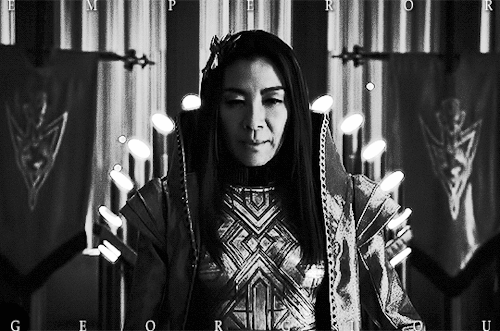
At the end of the day (and with the information currently available), neither of them are a good option for Michael to form an alliance with. On the one hand, she’s got the devil she knows; Lorca seems interested in protecting her, whatever his reasons, but fuck, he’s royally screwed all of the crew on Discovery over, and possibly the Federation too (remember they had the information needed to win the war but that don’t matter if they can’t deliver it). On the other, she has the devil she doesn’t know; Georgiou represents an evil empire, but hasn’t personally betrayed Michael and initially seems to be on-board with getting the infectious ideals of the Federation out of her empire and back where they belong. Obviously neither of them are trustworthy, but they aren’t trustworthy for different reasons. Hopefully Michael will be able to find a solution that doesn’t “side” with either of them and possibly plays them off each other.
Personally, I don’t even think either of them are going to be The Big Bad. I predict that dubious honor will go to:
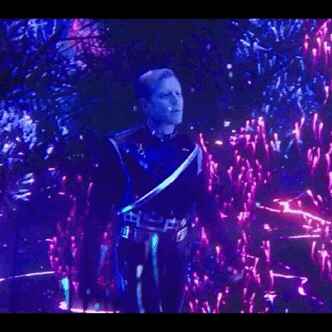
He only corrupted the Mycelial Network, aka The Cosmic Force That Binds All Life Together. Seems pretty important.
Just a thought.
Anyway, long story short, characters can be evil for different reasons and be equally deplorable (though is Lorca that different from the Emperor? If he was emperor, would he use his power any differently? He seemed pretty okay with the idea of killing all the non-human rebels. Even if it’s all a show and the end justifies the means...that’s pretty ghastly. Hopefully the next episode will shed more light on his character). It’s not a linear spectrum where one must be more evil than the other. They both, at present, look pretty fucking terrible from my perspective. Lorca might pull some more magic out of a hat and somehow make himself less horrible, but that also doesn’t mean he’s automatically a good guy. And Emperor Georgiou could assist the Discovery and that wouldn’t erase the fact that she’s a genocidal maniac. Complex as they both are, they’ve both committed acts of evil and they both should be held accountable for their past deeds.
27 notes
·
View notes
Text
Villains in Rebel: Thief Who Stole the People
Awhile back, I mentioned I had thoughts about Rebel: Thief Who Stole the People and villains, but kept not posting most of them. A couple people requested that I do that already, so here goes:
Consider this scenario:
***
A young man from a noble family grows up somewhere in between “poverty” and “poor relation” with only his mother to guide him after his father is murdered by a robber. As a child, he would play with his family’s servants, and one servant boy a few years older than him worked as his assistant in his studies and seemed very interested in learning, despite the fact that his social status would prevent him from every being able to do anything about those interests. Years later, he enters a prestigious school for young scholars.
He soon befriends another young man of noble birth who also seems out of place among their more affluent classmates, as his new friend grew up in near-solitude on a mountain, with only his family for any constant companionship. The two young men are taken under the wing of one of their teachers, and excel in their studies. Some time later, their studies completed, the two friends enter the palace together in minor clerical position. Somewhat by coincidence, their positions lead to their helping to expose a number of corrupt officials. Along with a few other instances, this causes them to be brought to the attention of the king, and they are soon given new, more elevated positions. The young lord is made a county magistrate, while his friend requests that he become an undercover investigator. The young lord sets off to his new post, desiring little more than to do his job well, and to care for his devoted mother.
An earnest and committed official, he advances quickly, and returns to the capital a few years later to assume a considerably better post, one that he has earned due to his talents. He is soon reunited with his friend, something that makes both young men happy, though they’re less happy with how each seems to have different interpretations of ho strictly certain laws should be upheld. Something happens, though, and the young lord’s friend begins avoiding him. Soon after, people in the court conspire to remove him from his new position and demote him, and he learns that his friend was the one responsible for it. His friend offers him no explanation, and the young lord is given a new assignment: to find and catch a bandit who has been attacking a number of noblemen.
This is when his mother drops the first bomb: his father had not been killed by a robber, but rather, had been murdered by a servant who had deceived and kept money from his father, and blackmailed his mother to escape justice. After murdering his father, the servant became a rich smuggler in a fishing village, effectively becoming the lord of that small community. The servant is dead, but his second son, who grew up in wealth and luxury after his father caused the young lord to grow up in near poverty, is the bandit the young lord has been looking for. In the following months, the young lord attempts to catch the bandit, and is even successful at one point, but faces frequent interference from his former friend. Growing suspicious, the young lord investigates his former friend, and eventually learns that his friend is not who he claimed to be, and is someone else who stole a dead nobleman’s identity. Then the second bomb drops: His friend is the older son of the servant who murdered his father, and actually the boy who assisted in his studies, and has been helping his bandit brother all along. Worse, his former friend has corrupted part of the king’s army, and caused them to turn against the king and join his bandit brother.
***
All the above could very, very easily be applied to any number of sageuk protagonists. In fact, aside from a few very character-specific things, most of it has shown up plenty of times. Revenge! Loss of position and rising in the ranks through hard work! Your closest friend becomes your worst enemy! Rebellions! Etc. The difference here is the perspective.
Su Hak did not “play with” the children of servants. He was a bully who forced them to entertain him. Amogae did not give little Su Hak rides on his shoulder out of fondness, he did it because Su Hak could have his parents abuse Amogae and his family if he displeased Su Hak. Gil Hyun and his desire to learn were objects of contempt, the actions of an inferior being daring to think about desiring things reserved for people who were inherently superior by virtue of birth. Amogae earned plenty money for his master, more than any servant had before, and the money he kept back was to attempt to buy the freedom of his family. While Amogae did, indeed, straight up murder his master, he didn’t do it out of greed, but to avenge his wife, who died because of Lord and Lady Jo’s greed. Gil Dong and co were, indeed, attacking noblemen, but they were corrupt noblemen who abused their position and the law. Gil Hyun kinda did Su Hak wrong in ditching him and selling him out with no explanation after learning the truth about their past, but he had already started to realize that Su Hak was not quite the kind, openminded friend he had always seemed to be. Their friendship was effectively over after the discussion of the husband who had been deemed just in murdering his wife for adultery. Gil Hyun (whose own mother had been falsely accused of adultery to justify the actions that caused her death) saw that it was an unjust and unequal law, and questioned whether the murdered wife had even been guilty, as friends and neighbors had seen nothing to suggest she was, and questioned whether the law could be considered a just law. And if the law is unjust, then it should be corrected. Su Hak agreed that there were problems with how the law was upheld, but not because it was unjust or unequal, but because some magistrates dared to make exceptions. The law is the law, and is therefore justice in and of itself, circumstance and exception have no place in it. Even without their then-unknown-to-them past, two men so fervently devoted to their own ideas of justice and interpretations of the law were going to end up in opposition to each other one way or another anyway. Beyond that doomed friendship: the king is a cruel monster. Su Hak either does not see that or does and finds it irrelevant, because the king is divine and untouchable, and the troops who turned on him did so because they could not personally justify the blind patriotism that forced them to carry out the king’s monster orders.
Here’s the thing: most sageuk villains are so very obviously villains at all times. They can be well developed, they can be interesting, sometimes they stop being villains and become allies, but the villainy shows through at all times in one way or another. That’s not the case with Rebel. Su Hak is a very earnest and committed young officer who wants to take care of his mother and serve his country. Lady Jo is a nice old lady who is devoted to her son, supports officials who she thinks are worthy and likes to meet her son’s friends. Teacher Song is a good teacher who engages in politics and seeks the betterment of the country. King Yeonsangun is a young king struggling to accomplish his goals in a court that still tries to test and manipulate him.
These aren’t false faces, they’re their true faces. But they’re only one side if these characters. Just like that sweet neighbor lady seems so kind and accepting until you see her confronted with something that doesn’t fit her personal moral world view, and voices opinions that make you feel nauseous and you don’t know if you should say something or just avoid engaging because who wants trouble with your neighbors? Or she says she voted for Trump, and it’s suddenly like she’s a new, awful person. Lady Jo is a nice old lady who loves her son but is also horrifying in her obsessive devotion to the class system, and her desire to destroy anyone who challenges it. Su Hak is an earnest and committed young official who is also a bigot, though he lacks his mother’s zealotry, and he couldn’t care less if the laws harm others because the law benefits him. (His bigotry and social superiority also repeatedly cause his downfall, because they lead to his ignoring the advice of the two smartest and most observant people available to him. (One because she’s a woman, even if it is his own mother, and the other because he’s a commoner.) Teacher Song is a good teacher who wants what’s best for his country, and he doesn’t care who is hurt or what lives are destroyed in the process, including using and abusing children. Yeonsangun was a young king who struggled against a court that wanted to manipulate and control him, and he’s also a king who is so drunk with his own divinity that he will destroy anyone who crosses him or interferes with him, and view everyone who is less divine as someone who exists for his personal enjoyment.
With the exception of Lady Jo, we only saw the “good” faces of these characters for quite some time. Sure, we knew Song was up to something for quite a while, but it took a long time and a number of reveals to really know how awful he is. History told us what to expect with Yeonsangun, but the show still made us question if maybe we should focus a bit less on the purges themselves and more on the actions of those who were purged. We knew how Su Hak was raised and what he was like as a child, but he was just so nice and friendly as a student that we al hoped he had overcome both genetics and upbringing. The thing is, none of the villainous revelations were surprising. Shocking, sure, and Su Hak in particular was a punch in the gut to most viewers, but everything was always there, the characters themselves simply sell their own worldviews to an astonishing degree. This is WHY they’re good villains. With the exception of Yeonsangun, they aren’t all villain all the time. They’re normal people who have sides to them that we find reprehensible.
Sidenote: I don’t know if Su Ha was deliberately written to be a vicious deconstruction of sageuk heroes, but he’s a very good one.
Pedo Prince (I still can’t be bothered to learn his name) is the only exception to this. He’s all villain all the time, but he’s also by far-and deliberately-the least developed of the villains. He’s dangerous because of his position and important to other villains because of what his position provides him, but he’s also pretty irrelevant as an autonomous character, and exists largely to help push the plot in certain ways.
I haven’t included Mori or Noksoo in this because they’re harder to pin down, and I don’t think either qite qualifies as a villain. The most truly evil thing about Mori is his eyeliner, and for the most part, the show has stopped him from carrying out the tasks he’s given that would really qualify as “evil,” either because someone stops him, he hesitates long enough for Gil Dong to swoop in, or he actually makes a choice for once. His big issue is that that boy needs to just start making his own choices and attaching himself to better people, instead of attaching himself to awful people who use him and just going along with them. Noksoo is a more complicated. She’s ambitious, certainly, but we also know that at one point she saw herself as monstrous for what she perceived as her cruelty, when in truth, it was what she had to do to survive the life she was in. The historical Noksoo was apparently quite the piece of work, but it’s hard to say whether or not the same applies to our Noksoo. She can be petty and cruel, but it’s hard to say how much is truly pettiness and cruelty, how much is to show the side that Yeonsangun likes (I mean, the dude pretty much fell in love with her after he learned she used him in an elaborate scheme too get revenge against her childhood abuser, obviously he likes her vicious), and how much is displaying cruelty herself so that Yeonsangun won’t exact a worse cruelty.
This was written on Saturday but scheduled for Tuesday by request since the show is being preempted for presidential debates, so its entirely possible that something will happen on Monday to change my perspective on something in here and I won’t remember to update this.
#rebel thief who stole the people#rebel hong gil dong#kdrama#sageuk#tief ho stole the people is definitely the most appropriate subtitle after last week's episodes imo#but hong gil dong has always been fandom's refered subtitle
20 notes
·
View notes
Text
hogwarts au rundown.
name: Pearl Madlabayan (birth name, Tagalog for “common people”; adopted family surname is Diamant)
house: slytherin
wand: aspen and unicorn hair, 10 1/4 inches, brittle
patronus: lark
wand analysis.
aspen.
Wand-quality aspen wood is white and fine-grained, and highly prized by all wand-makers for its stylish resemblance to ivory and its usually outstanding charmwork. The proper owner of the aspen wand is often an accomplished duellist, or destined to be so, for the aspen wand is one of those particularly suited to martial magic. An infamous and secretive eighteenth-century duelling club, which called itself The Silver Spears, was reputed to admit only those who owned aspen wands. In my experience, aspen wand owners are generally strong-minded and determined, more likely than most to be attracted by quests and new orders; this is a wand for revolutionaries.
unicorn hair.
Unicorn hair generally produces the most consistent magic, and is least subject to fluctuations and blockages. Wands with unicorn cores are generally the most difficult to turn to the Dark Arts. They are the most faithful of all wands, and usually remain strongly attached to their first owner, irrespective of whether he or she was an accomplished witch or wizard.
Minor disadvantages of unicorn hair are that they do not make the most powerful wands (although the wand wood may compensate) and that they are prone to melancholy if seriously mishandled, meaning that the hair may 'die' and need replacing.
i chose this wand for pearl partly because of the Aesthetic™ of having a white wand, which is reminiscent of her spear (esp if i hc that there’s a subtle spiral pattern in the woodgrain), but also because the aspen hints at her eventual mastery of dueling, and for the part about being drawn to quests and new orders. a wand for revolutionaries indeed.
unicorn hair is not the most powerful wand, which fits because pearl is not the most powerful witch in terms of magical ability, but it is steady and faithful, also fitting because pearl, too, is prone to fits of melancholy if mishandled.
house analysis.
here’s where it gets interesting. pearl is difficult to sort - she has attributes from all houses, really. like gryffindor, she values bravery and chivalry and believes you should fight for what’s right. like hufflepuff, she’s loyal and nurturing. like ravenclaw, she values intelligence and thoughtfulness and has a thirst for learning. like slytherin, she’s ambitious, determined, and cunning.
slytherin may not seem like the obvious choice for her, as someone who upholds both the ideal of a chivalrous knight and a learned scholar. but here’s the thing: if pearl had been raised in a healthy, encouraging environment - if her love of learning had been allowed to blossom, if she had been given validation and room for emotional growth - she would have been in ravenclaw, no doubt.
but both in canon and in this au, she was neglected, mistreated, and dismissed for most of her life. she is genuinely inquisitive and thirsty for knowledge, and she does love learning for its own sake, but she’s also learned that she can use knowledge to get ahead, to be recognized, and so that’s a large part of her motivation to learn: a thirst to prove yourself, as the sorting hat once said. slytherin trait.
she is logical and loyal and tries to be fair, but she also has a deceitful streak. though she never means to cause harm, often the only way she can think of to get what she wants is to manipulate others into it (i.e. the sardonyx incident in canon), because she’s too scared of conflict to talk about things openly and too convinced that she won’t be given validation otherwise. so her first instinct (which she does learn to battle) is deceit. slytherin trait.
she’s cunning and pragmatic; she doesn’t like conflict, but she’s also willing to hurt or kill someone if it ensures the safety of her own group. slytherin trait.
also, loyalty is a hufflepuff trait, true, but slytherins are also loyal, they just aren’t as impartial about it. pearl will choose a small group to be intensely loyal towards, and dismiss those who aren’t a part of that group. slytherin trait
additionally, pearl has crippling self-esteem issues, which leads her to harbor a desperate need to feel superior to others. we see this in canon in the way she treats greg and other humans; after feeling inferior for so long, she clings to any sense of superiority she can find and lords it over those who are “below” her, which can give her a condescending air. slytherin trait.
it’s important to note, of course, that none of this makes her an inherently bad person!! slytherins aren’t inherently bad people. pearl isn’t always kind of patient or right, but she is ultimately good, and her slytherin traits can contribute to that just as they can detract from it.
of course, if she were given the choice between ravenclaw and slytherin (if hogwarts sorting worked like ilvermorny, for instance, and you got to choose your preference if picked by two houses), then she’d pick ravenclaw. she does not, at least initially, see herself as a slytherin. she didn’t expect to be sorted there, and she isn’t happy to be there for multiple reasons, which i’ll get into more when we get to backstory. it takes pearl a long time to grow to be proud of being a slytherin, and she’ll always have reservations about it because of its stigma, but while she does eventually take a certain measure of (defiant) pride in her house, she’ll always wonder who she might have been, if she might have been better, if she’d gone to ravenclaw.
history.
pearl was born to a squib and a muggle. her mother came from a prominent pureblood family, the diamants, and was disowned from them when it became clear she possessed no magical ability. when pearl’s parents died - only five years after her birth - it was therefore in the diamants’ reluctant care that pearl was placed.
she was not treated well there. technically she was mrs. diamant’s granddaughter, and a half-blood, but to them she was little more than a mudblood, and she was treated more like a house-elf than a child. she was mistreated and neglected, ignored in favor of the diamant children. though clever and inquisitive, she was given few lessons, and most of her knowledge came from sneaking into the family library at night to read by candlelight.
she showed signs of magic late for a magical child - not until eight years old, when most experts put the cut-off age at seven - and her magic was weak and sporadic. but magic it was, and she received her hogwarts letter when she turned eleven, just as the diamant children had. this was a terrible relief to her; she dreamed of the day when she could attend hogwarts, away from the diamants, where she could learn magic and be just like any other child.
but when pearl, scrawny and timid beside the other first-years who laughed and talked together, sat under the sorting hat, it put her in slytherin. there must be some mistake, pearl thought. slytherin was where the diamants were, slytherin was for the kind of children who kicked her around and called her mudblood. she had wanted ravenclaw. she had expected ravenclaw. that was where she would have been free.
but the sorting hat said slytherin, so she was given a tie of green and silver and sat at the slytherin table amongst children she knew, children she had met at the diamants’ banquets, children who already knew her as the little mudblood, or even worse, as the house-elf. during her first dinner, one of the older students who knew her foster sister suggested that she go down to the kitchens and bunk with the other elves.
pearl’s first months at hogwarts were not happy ones. she was not popular in slytherin, but nor did anyone else want to be friends with her, because she was a slytherin and slytherin was the evil house, wasn’t that how it went? and to make matters worse, pearl struggled in her classes. she understood the theory fine, could memorize any term or definition she needed, could write twice the required length for essays - but in class, her spellwork suffered. everyone else could make their feathers float. why couldn’t she? everyone else could turn their matches into needles. the only class she excelled at was potions - there was no wandwork there, you only had to follow directions, and she could do that.
so she spent those first months alone and despondent, keeping away from other students when she could, throwing herself into her studies in the vain hope that it would make her less weak. because that was the only possible explanation, as the other slytherins were quick to point out to her - her parents didn’t have magic, she was a mudblood, she wasn’t as powerful as they were and she never would be.
she couldn’t accept that. she wouldn’t. if she had to work twice as hard as everyone else to pass, then she would. she spent her time studying, practicing by herself, determined, stubborn, but lonely.
and then she met rose. rose was a hufflepuff, a year or two above pearl. rose came upon a group of slytherins ganging up on them, and made them leave, and then conjured a bunch of flowers from her wand to cheer pearl up. rose was kind and encouraging and didn’t seem to care that pearl was a slytherin and a mudblood and a bad witch. she offered to help pearl practice.
and from then on pearl wasn’t alone. rose showed her how to perform some of the spells that pearl couldn’t seem to grasp. rose invited her to eat breakfast with her in the mornings, even when other hufflepuffs shot pearl nervous looks when they saw the green trim on her robes. rose was the first friend pearl had ever had.
and through rose, pearl made other friends. garnet was a solemn gryffindor, quiet but kind. (and exceptionally good at divination; pearl was awed by her predictions.) amethyst didn’t come until a year later, and she was not a solemn gryffindor, she was a rowdy gryffindor and a metamorphmagus to boot, and sometimes she made her nose long and pointy like pearl’s and laughed, but she was earnest and friendly and rough. the four of them became close-knit - even when pearl felt like the odd one out, the skinny slytherin among two gryffindors and a hufflepuff, even when she wondered if they were only friends with her out of pity, even when she felt herself growing desperate to please them, to keep up with them, so they wouldn’t leave her behind - it didn’t matter, in the end, because she had friends and she wasn’t alone.
gradually she grasped her schoolwork. she would never be very good at transfiguration, and she still had to spend hours practicing before she could master any of her spells, but her grades rose, in charms and defense against the dark arts especially. and in potions, of course, she continued to excel. she clawed her way, not quite to the top of the class, but very nearly so. she was still scorned and teased by many of her schoolmates, but she forced herself to turn the other shoulder - it only motivated her to work harder.
after graduation, they were swept into a war.
the dark lord was ever rising in power, and a group grew up to resist him: the order of the phoenix. rose wanted to join the rebellion, and pearl, of course, stood by her side. they ended up right in the thick of it, and pearl, the witch who had once struggled with the most basic spells, found herself dueling for her life on a regular basis - and, to everyone’s surprise, winning.
not without cost to her. the fighting exhausted her - she was never the most powerful witch, and no amount of training and mastery of spellwork would increase the mana she had to work with. she would fight to the point of exhausting her magic, and what’s more, she often threw herself in front of her allies, taking hits she needn’t have taken to save them (particularly rose), which often sent her to st. mungo’s for healing. as skilled a duelist as she became, she was lucky to make it through the war.
and while the war was going on, there was another disaster to contend with.
rose had fallen in love with a muggle.
rose, who pearl had loved for years, had become totally charmed by this greg - who, of course, knew nothing of the war, nothing of the battles rose had fought. pearl told her it was a bad idea to get involved - told her that she’d only be bringing some poor muggle into a world rife with chaos - but it was no good. they were married, and pearl had to hide her own heartbreak.
they had a child. his name was steven, and even pearl couldn’t help being taken with him. but that point of light did nothing to block out the awful truth: they were losing the war, and it seemed increasingly unlikely that steven would grow up with any sort of happiness.
and then the worst happened. rose was targeted by the death eaters. they came to their home. she was able to hold them off long enough for greg to call for help and get steven away, but by the time pearl, garnet, and amethyst arrived, it was too late. rose had been killed in her attempts to keep the death eaters away from her family.
the war ended soon after that. the dark lord was vanquished, and the wizarding world breathed again. but rose was still dead, and pearl had never, in all of her difficult life, endured grief so acute.
in the end greg raised steven in a house by the beach, with pearl, garnet, and amethyst often coming by to spend time with him. pearl took up teaching study of ancient runes at hogwarts, and headed the dueling club as well (which totally existed before lockhart started it shhh). her focus was on managing her job and keeping an eye on steven - but when the dark lord returned, she, along with garnet and amethyst, rejoined the order of the phoenix to fight the new enemy.
#; you build yourself from the ground up. you will be of your own making. ( about. )#; hogwarts au tag#long post //#( can u tell i lost steam near the end of the history lmao )#( whatever i fleshed out all the important stuff and it's flexible anyway )#( but WHAT'S UP Y'ALL I SPENT SO LONG WRITING THIS )#( end me )
11 notes
·
View notes
Text
Lino Brocka / Mike De Leon Auteur Theory
The Auteur theory is a way of looking at films that state that the director is the author of a film. It argues that a film is a reflection of the director’s artistic vision. It will have recognizable, recurring themes, and visual queues that inform the audience who the director is and shows a consistent artistic identity throughout the director’s filmography (-Indie Film Hustle). Look at Wes Anderson for example. The recurring cast and shots and color grading will tell you that the film you are watching is definitely directed by Wes Anderson.
Now looking at Lino Brocka. Let’s compare the movies Maynila sa kuko ng liwanag and Insiang using the Auteur theory but first let us talk about the film.
Insiang is a Philippine drama directed by the famous Lino Brocka and the first ever Filipino film entered in the Cannes Film Festival. He tackles the difficulties in living in poverty in the streets of Tondo mainly in the eyes of the main character Insiang acted by the famous Hilda Koronel. The film portrays a woman, Insiang, living in poverty with mountains of problems and is in an environment of abuse and discrimination where she had to adapt to survive or get what she wants. Insiang’s life was tough and the film clearly shows what its like to live in poverty in Manila. Tonia, Insiang’s mother let some of her ex-husband stay with them but proved to be a hassle because of the lack of money and food and too much kids to actually help in providing money to help the family survive. Insiang on the other hand is a beautiful woman whose boyfriend’s only goal is to deflower her maybe to prove his manhood to everyone since after he deflowered her everyone in the neighborhood knew about it. Tonia got tired of the constant fights and providing for those relatives and decides to kick everyone out except her own daughter Insiang and then the relatives were replaced by Dado, Tonia’s younger boyfriend who is know as the bad boy of the town. Dado grew tired of his sex life with Tonia and now wanted Insiang. Dado then slept with Insiang and then Insiang knew she could use Dado to get revenge on everyone who hurt her even Dado himself. The films progression gradually goes from bad to worse and lastly the feeling of success, or relief. Lino Brocka gives the audience a heavy feeling all throughout the film because of all the hurdles Insiang had to face but in the end the audience will feel that heaviness disappears because of how Insiang got her revenge.
Maynila sa mga Kuko ng Liwanag or Manila in the Claws of Light is a Filipino drama directed by Lino Brocka. He tackles the difficulties of a “probinsyano” living in manila. The film is focused on Julio Madiaga played by the famous Bembol Roco who was a fisherman in Manila in pursuit of his loved one. He tackled the different difficulties a lower class Filipino encounter from inequality, corruption, and sexual exploitation. These difficulties and obstacles are faced by most lower class Filipinos trying to make it big or just even trying to make money for their day to day lives. Abuse is one of the main topics of the film from the abuse of the foreman’s power in not even giving the full wage of the carpenters wages but compromises with the use of “Taiwan” which is kind of like insurance or get more money later in turn of a small fee and the exploitation of Mrs. Cruz to hopeful probinsyanas that only wants to have a better future but in turn forced into sex work for money. In the end, his pent up rage because of all the obstacles he faced, all the challenges, and all the sacrifices and even meeting Ligaya, he burst. He was hopeful that he would finally get what he wanted. To spend his life with his childhood lover, Ligaya. His hopes of having his lover spend the rest of his life ended abruptly when their plan of escape didn’t work which in turn caused Ligaya’s death. Lino Brocka showed that even if you do everything in your power to protect someone, it doesn’t always go your way.
In those two films you can already tell what kind of director he is or what his artistic vision with his filmography are. One of the most common themes in his filmography is poverty. Looking at these two films, poverty is prevalent in his films. How a character tackles poverty and what they do in their lives. There are also recurring cast members in both films which is Ligaya and Insiang played by Hilda Koronel. There is also recurring sex scenes in both films. Both films also tackle the hard life one faces and the challenges they try to overcome. Both films become a bit dark in a sense of how they resolve the issues they have. The two films share good character development in a sense that the main characters start of as nice people but grows the feeling of having revenge on the people who are making their life hard or preventing them in becoming happy. The main characters were oppressed or they had to get out of their comfort zone just to survive their harsh environment. In both films, they got their revenge in the end. Both by killing the ones who were causing them harm but in Insiang’s case she manipulated people to make that happen. A Lino brocka film, looking at these two films, will tackle issues of poverty, love, and vengeance.
Now let’s look at Mike De Leon’s films specifically Kakabakaba Ka Ba? And Batch ‘81
Batch ‘81 is a Filipino drama directed by Mike De Leon. He tackles the difficulties neophytes face when joining a brotherhood or fraternity. The film is seen through the eyes of Sid Lucero who is portrayed by the famous Mark Gil. The movie starts off as a simple life of a normal big ego college student that comes to class late and gets flamed by his teachers. That was before he joined the Alpha Kappa Omega fraternity which is one of the most prestigious universities in that specific university. As a neophyte, he was subjugated to intense initiation rites in a span of a couple of months. He had to endure physical, emotional, and psychological pain. He was inherently forced to call his seniors masters as a sign of respect and also to know their place as a measly neophyte. He needed to follow the ‘masters’ orders for any humiliating or physically taxing activities to prove their commitment to the fraternity. He had to endure hazing by means of being hit by a paddle repeatedly multiple times, pain experiments, and running in the streets with only their underwear. It seemed like they were being stripped off of their human rights which draws similarity to the Marcos Regime at the time the film was made. There was a bit of lightheartedness during the film which balances out the seriousness and the emotion of the film. There are parts where they are getting humiliated but the emotion the scene gives is fun and happy. There was a part in the film where they were all blindfolded and stripped naked while the ‘masters play an audio clip of women. It kind of shows that the masters are playing one big joke on the neophytes but it gives the audience a feeling of lightheartedness in a film that tackles a lot of seriousness. There are hints throughout the film about martial law or the Marcos regime from the scene of their fellow neophyte was told to act to be electrocuted while sitting on an electric chair controlled by the seniors which is similar to how some people were tortured during the regime. The film showed some breaking of individual rights and following orders from a superior and being punished when they are not followed which is similar to how the Marcos regime worked.It seems that Mike De Leon wanted to show the viewers how bad martial law is looking at the film. The cabaret scene where they acted as Nazis might be a direct comparison between Adolf Hitler and Ferdinand Marcos.
Kakabakaba Ka Ba? Is a 1980 musical-romantic-comedy directed by Mike De Leon. The movie starts of as a Japanese guy tries to smuggle drugs using weird and funny ways to do so in the Philippines. After a lot of failures he is scolded by his master and apparently he’s a Yakuza. He tries again as his last chance to prove himself and not disappoint the Yakuza. He sits with Johnny the main protagonist of the film and slips a cassette tape in his jacket pocket. The movie follows two couples or lovebirds trying to find out why there are people following them and trying to mess with their lives only to find out there are drugs in the cassette tape they were looking for. They go on a funny adventure meeting a rockstar/druggie, a priest, nuns, and a samurai. They even dress as priests and nuns to infiltrate their secret base. The movie is filled with music and great choreography. It’s a fun film to watch with friends even if its more than 30 years old.
Talking about the auteur theory, it seems like the recurring theme in regards to his films is music or dance numbers, and comedy. There is always a hint of comedy throughout his films. I noticed that there are parts or scenes that happen because of romance and also fight scenes. The films arent marketed as action movies but there will most likely be a fight scene but Kakabakaba Ka Ba’s fight scenes are more comedic. They also share a similarity on how he makes different people or scenes over the top or comedic. One example is the Cabaret scene in Batch ‘81 when they dressed up like women and sung and danced and the nuns in Kakabakaba ka ba that were seemingly just praying but suddenly their prayer becomes a full out sing and dance number. I can also see that they both seem anti-marcos films. Batch ‘81 is a film that the protagonists individual rights were basically stripped away and they had to follow orders from their ‘masters’ and the cabaret scene I mentioned featured Nazi’s and Hitler which may be a comparison to Marcos’ way of ruling the country. In Kakabakaba ka ba I feel that the Yakuza master is kind of like Marcos in a way that his henchmen will do anything for him without questioning him. Also there are spies spying on the protagonists and I believe that happened back then as well. What I believe, a Mike De Leon film is, is a film that has deeper meaning than what is shown in the film and beyond all of the seriousness there is comedy.
0 notes